Text
[TEXTBOOK REVIEW] Integrated vs. EWHA
In the 5-ish years I’ve been off and on studying Korean, I’ve largely worked with Talk to Me in Korean, Integrated textbooks, and EWHA textbooks. I’ve never felt the need to venture into other textbook series (though I’ve been peeking through and I guess technically working with another since coming to Korea, but only in a sense of review.) Good textbooks differ for person to person - we all learn in our own styles and need things presented to us in different ways.
This system has been invaluable to me. As a self-studying learner, the kind of textbook you use is really important, because most of us don’t have a teacher to correct us or further explain things, and likewise, many of us don’t have a Korean friend or Korean-speaking friend to assist along the way. I’ve been lucky to have friends to help, but still, the textbook I used was very important for this.
Thus, I have a hopefully detailed and terribly picture heavy review of both Integrated and EWHA textbook series and how they compare to each other or how you as a learner can utilize them together or with other books!
When I got my first textbooks, I’d already taught myself to read and write Hangul and had been working quite a while with Talk to Me in Korean. As a result, I was a bad student and skipped a lot of the stuff at the beginning of the textbook. If you’re a new learner: DON’T DO THIS! There’s a lot of invaluable information, especially in the Integrated series. I’ve brought my beginner book to language exchanges before and have swayed a few people into buying some of the books I use because they found the beginning information alone to be hugely beneficial.
My first textbooks were the Beginner Integrated series. My decisions were based on the fact that I already had friends using these books - it would make it easy for me if I had questions, as they’d already worked with these before - and also the price. At the time I got them, I was able to get both Beginner 1 and 2 for about $35. Unfortunately, that was 5-ish years ago and the price isn’t quite as low and is much more on par with other textbooks.
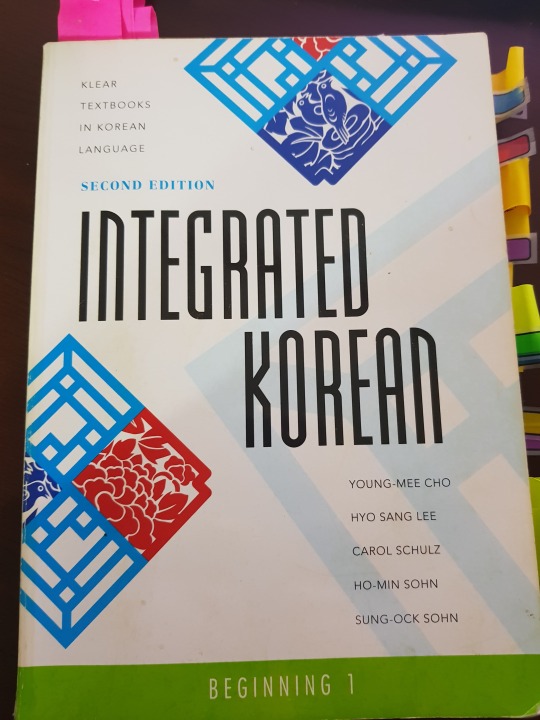
Please don’t mind how old and beaten up looking it is; this guy and I have been through a LOT together!
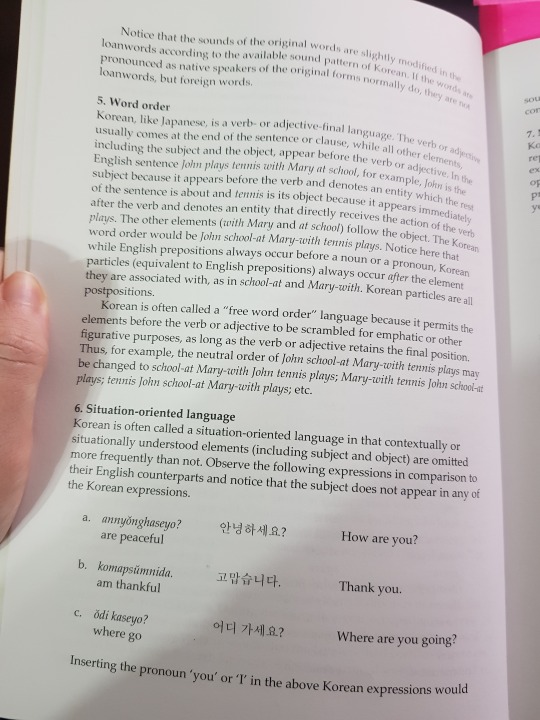
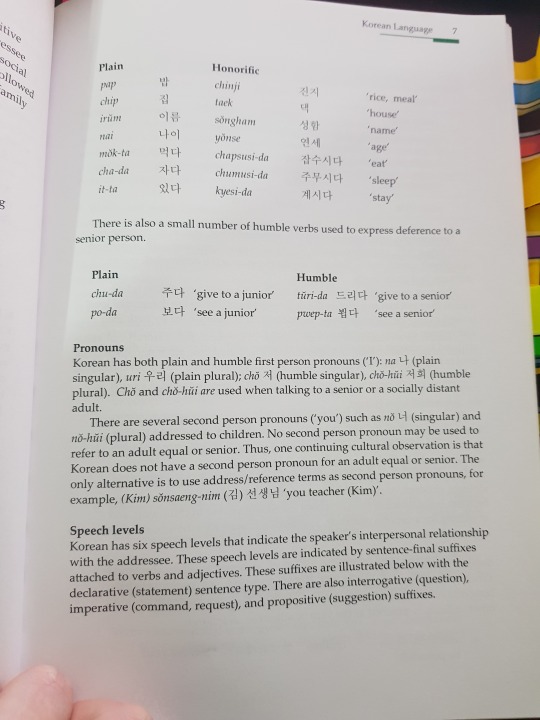
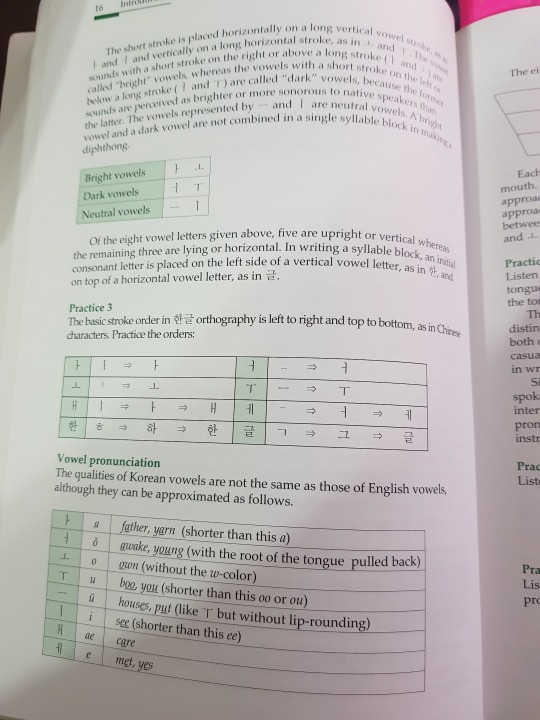
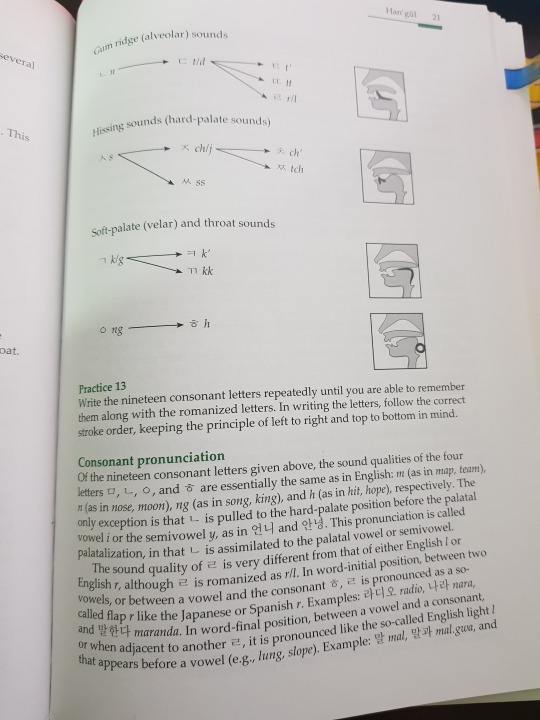
This is the stuff I skipped when I first got the book, and frankly, would have been invaluable to my learning. From the way I taught myself to pronounce Hangul, even these days I still have to push myself to differentiate my 으 from 우. But visually seeing how these sounds are formed is really important, especially for beginners. There’s a lot of sounds we as foreigners and especially as beginners struggle to differentiate. When I help at Diana’s classes, I find a lot of people have issues with 어 and 오 - let alone 에 and 애 and further 스 or 쓰. Of course it’s not a foreigner only thing; at the language exchange, while helping Koreans with pronunciation, I’ve found they sometimes hear things that aren’t there or can’t differentiate certain sounds, either. That’s just language. But knowing how to say things not only helps your pronunciation but when you’re talking to someone, watching the way they speak can help you differentiate sounds as yours ears get used to it.
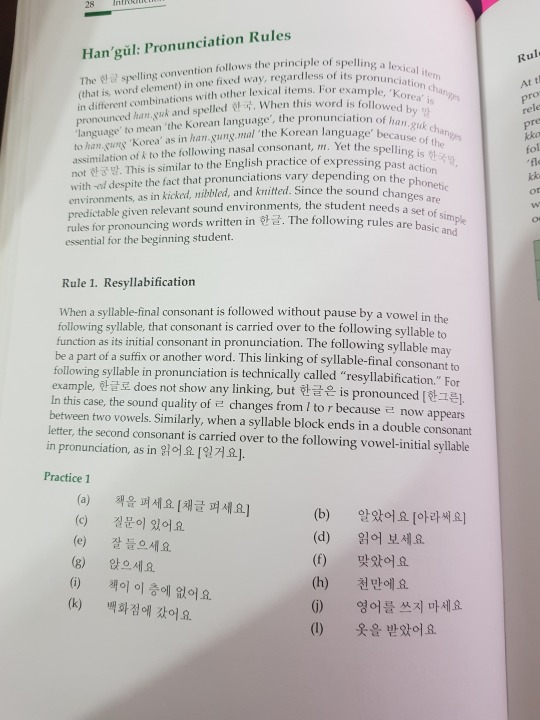
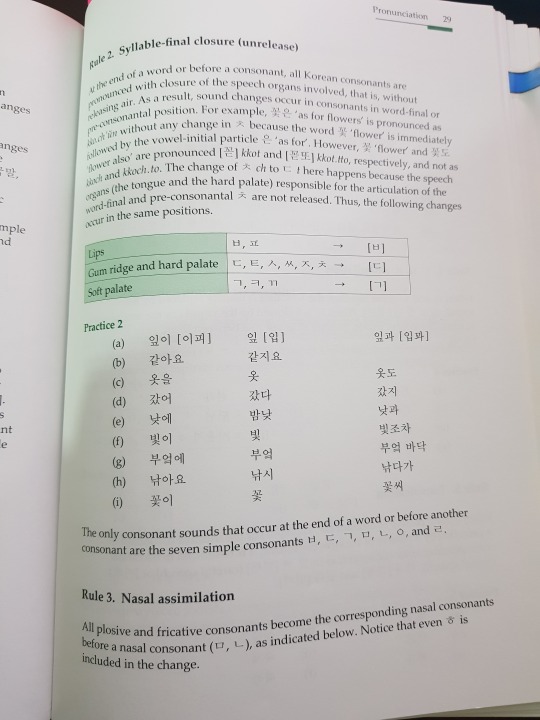
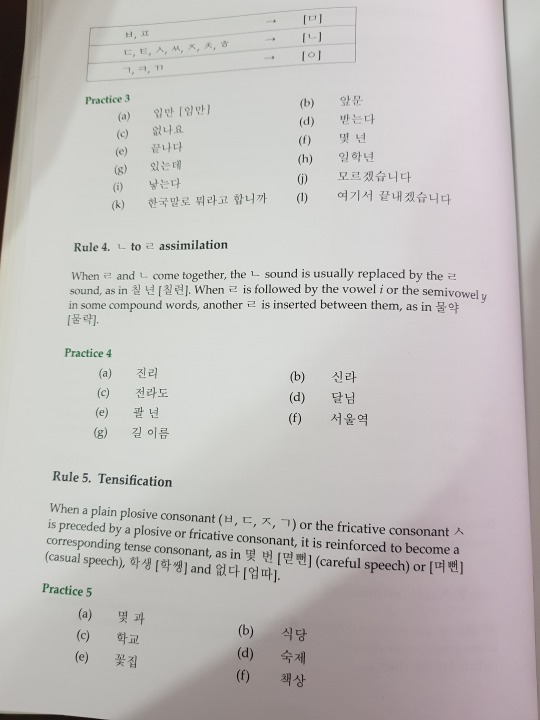
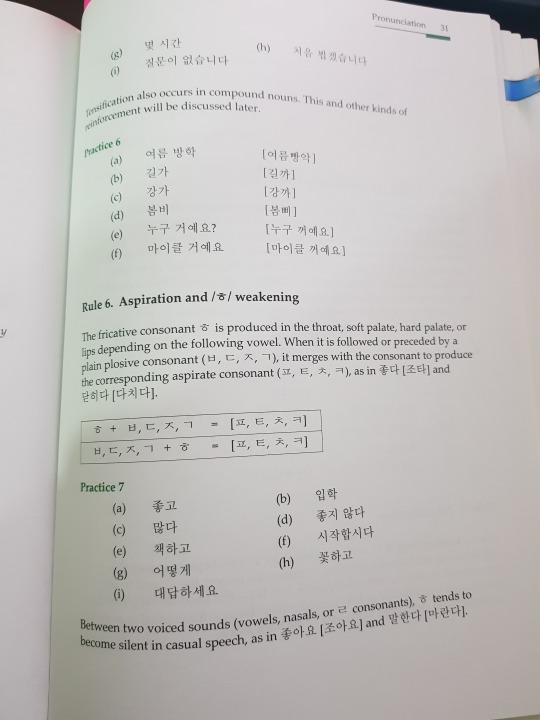
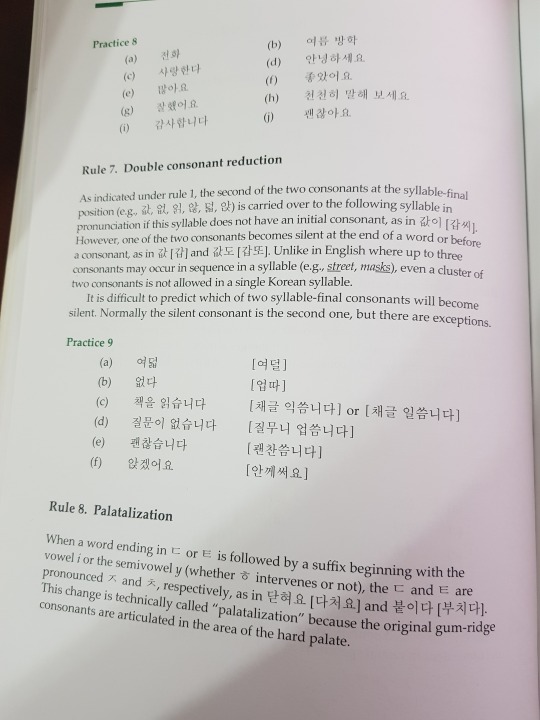
It’s actually quite extensive. Again, if I’d read the beginning, I would have figured out things like resyllablfication - a mouthful that simply means consonants carry over into empty spaces to make pronunciation MUCH easier. Instead, I spent a good while mispronouncing everything and wondering why speaking was so difficult.
Now let’s get into the good stuff!
Integrated is set up into Lessons that are then broken up into 2 conversations/dialogues. After each conversation, you’re given a new word bank, and some new words and expressions in your notes. After that it’s a couple to few pieces of grammar. Sometimes that grammar is a full grammar piece (like a sentence ending), sometimes it’s a particle, sometimes it’s about irregular /ㄹ/ or /ㅡ/ or something.
Typically, integrated is very detailed. There’s usually a lot of notes, examples that show varieties of way of use, and then exercises! I never got a workbook with Integrated so I can’t tell you much about it, but because a. I had no one to check it and b. I have so many exercises in the book, I didn’t regret this. A friend of mine who has used integrated told me that she feels the exercises in the book are sufficient enough because they’re very similar to what you see in the work book anyway.
Let’s have a look!
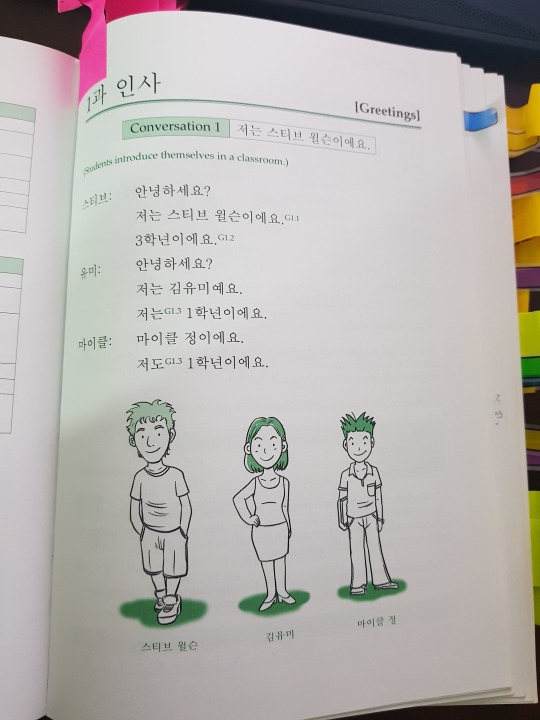
Look how short these dialogues start out. Ahh, nostalgia~
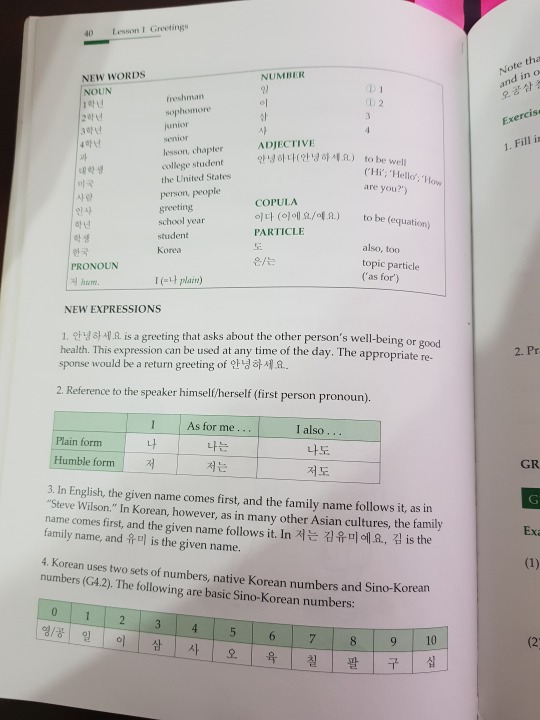
The word bank is always sorted by word type, which becomes useful when you get further in and realize that sometimes adjectives are conjugated differently from verbs! The New expressions heading usually is followed by really useful stuff that doesn’t always warrant its own grammar lesson but still is relevant to your learning.
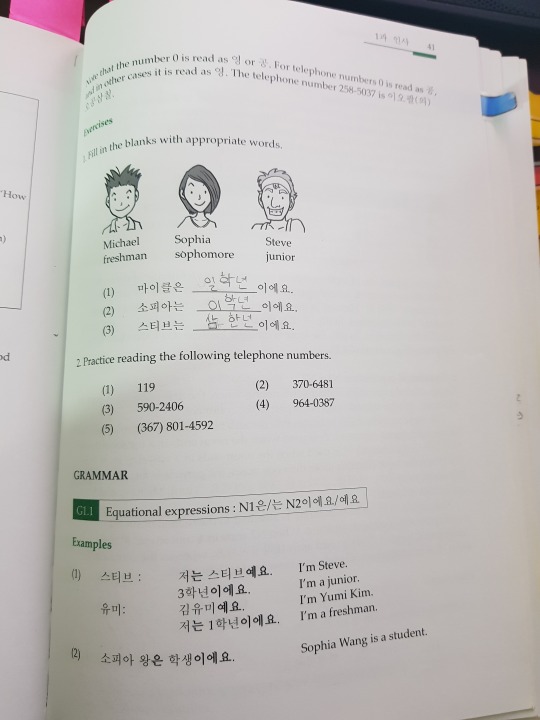
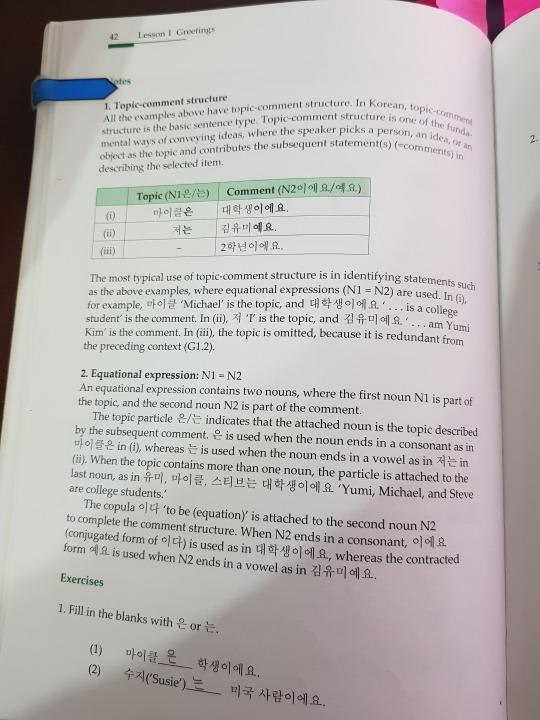
Grammar is always introduced first by examples and then explained in the notes. As you can see, Integrated can be very verbose in its explanations. For some people, this is beneficial. Others, not so much. I tend to like to learn my grammar inside and out; I’m not that great at learning by example or inferring reason, so this very verbose manner of explanation is great for me. Also, I have a tendency to overthink things, so when it’s laid out, it helps.
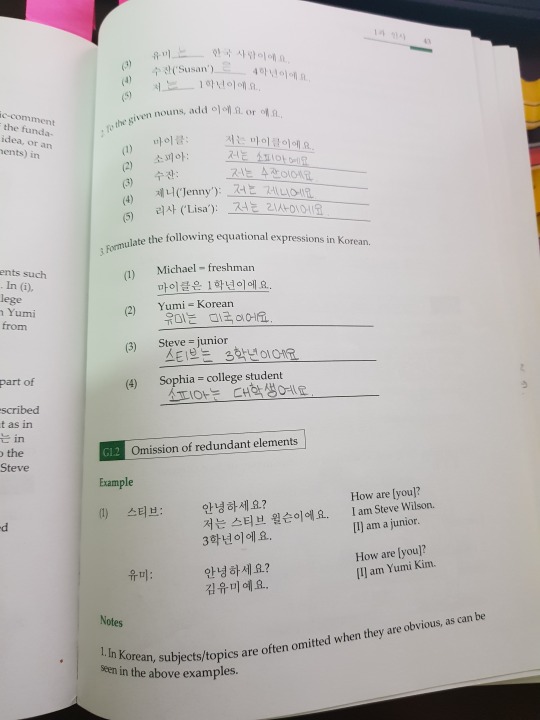
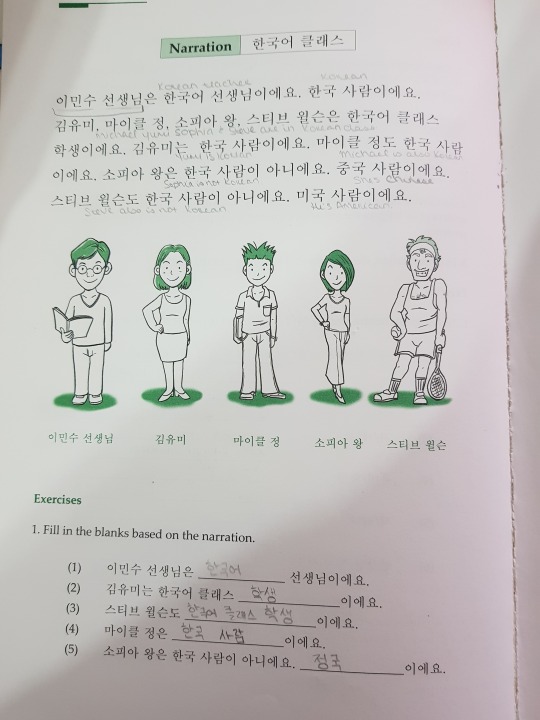
The end of the lesson is always presented with a narration that uses all of the grammar you learned in the past lesson and whatever the lesson’s central theme was (university life, transportation, food, etc.) There’s comprehension questions and activities. But the best part of the end of the lessons is all the stuff they tack on!
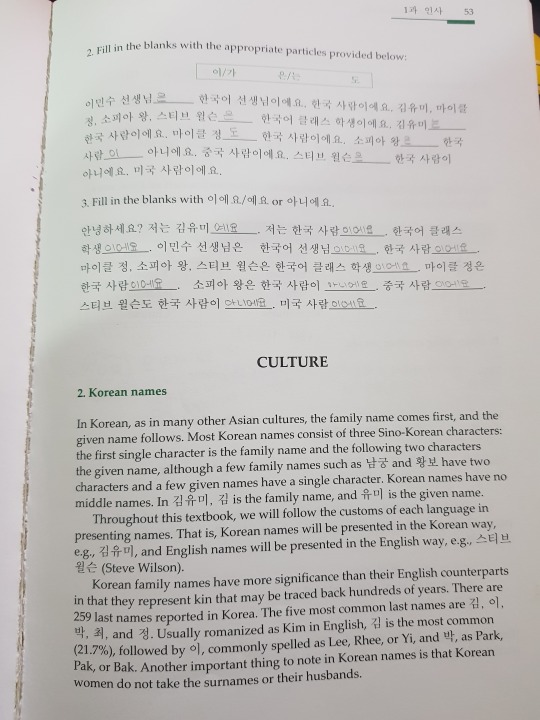
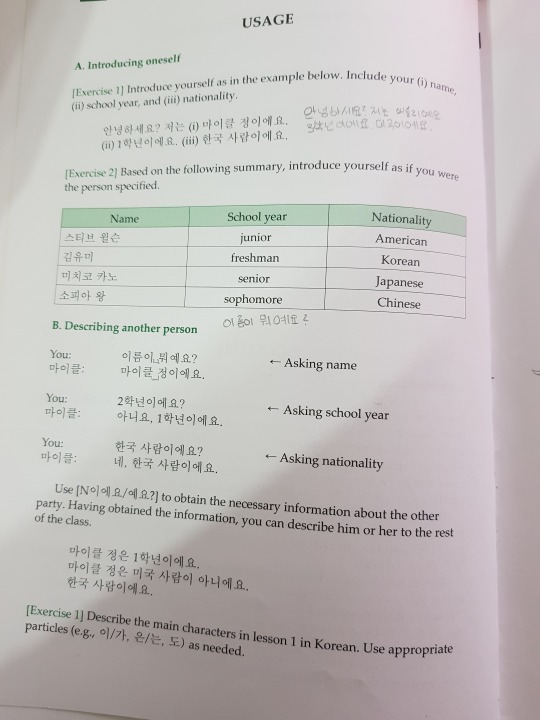
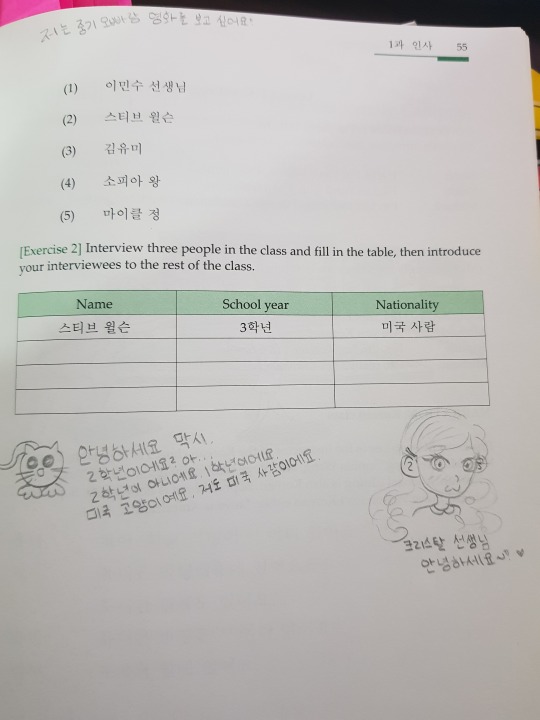
Ignore the doodles, pls. And the notes. I was a mess, okay!
The end of the lesson always features some kind of culture lessons where they teach you various matters about life in Korea and Korean society. It also goes further into detail about usage. Language is not a one way kind of thing. The way initially presented in the textbook is not the only way to say or express things. Further, it has more activities that build upon what you’ve done throughout the lesson. See why a workbook is virtually unnecessary?
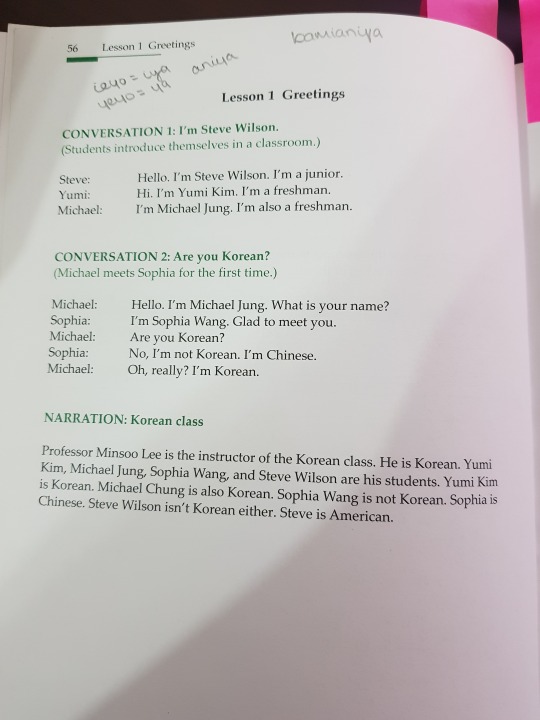
Importantly, the end of the lesson has conversation translations. As you can see, there’s no answers for the exercises, which could be a make or break thing for people. Having no one to correct it makes it hard to utilize the exercises.
Despite the fact that the book lacks answer keys, I find Integrated has been invaluable to my learning. Admittedly, I may be biased because of the time I’ve spent with these books, and thus I’ve grown fond, but even in retrospect I still feel they were and are incredibly useful.
Integrated textbooks are thicker than my EWHA textbooks - they're roughly the size of 2 EWHA books, which seems to make sense because Integrated has two beginner books and I believe for EWHA, level 1 and 2 are considered beginner and 3 seems to start on an intermediate level. As Integrated books are so big, they’re full of information. FULL! The first beginner book alone presents quite a lot of conversational grammar and vocabulary and beginner 2 (what I would think of as high beginner to myself) further expands on it.
Admittedly I was the most inconsistent studier until I came to Korea, so it’s probably unsurprising that I’ve worked out of these two books for the entirety of the time I’ve been learning. In fact I only JUST made it into my Intermediate books. I have a lot of reasons for that, but the point I’m trying to make is that I’ve spent all these years able to use the grammar and vocabulary from these books, so it’s really quite beneficial in my eyes.
(A comparison, for example, is the book my friend teacher Diana uses. Her lessons follow Beautiful Korean, a book that has 3 books in the beginner series, I believe, and each costs 16,000 won. Considerably cheaper, sure, than Integrated Beginner coming in at 30 a piece. But when you consider again that Integrated is the size of 2 textbooks, the price seems to even out. Further, Through us using Beautiful Korean, most of what we learned was only pronunciation and vocab. Only at the beginning of the 1-1 lessons were introductions and the most basic sentences and structures introduced. The actual act of making sentences and grammar doesn’t show up until 1-2. So further, if you consider comparison, you need all 3 books from the beginner series of Beautiful Korean to possibly probably equate to Beginner 1 and maybe 2? idk I haven’t seen what comes after Beautiful Korean 1-3; it might still be beginner level for all I know! That’s not to put down the Beautiful Korean series at all but as far as values, when you consider all 3 books will cost about 48,000 won, Integrated, to me, seems more valuable. But I digress.)
Integrated Beginner 2 stays much the same and follows this same format. In fact, even in Integrated it does, though notably the conversations grow longer and now after each conversation there’s comprehension questions, which is a welcome addition!
That said, EWHA certainly has it’s merits, and my shallow self will admit the fact that they are ever so pretty certainly endears me towards them - but I promise it goes well beyond shallow reasoning.
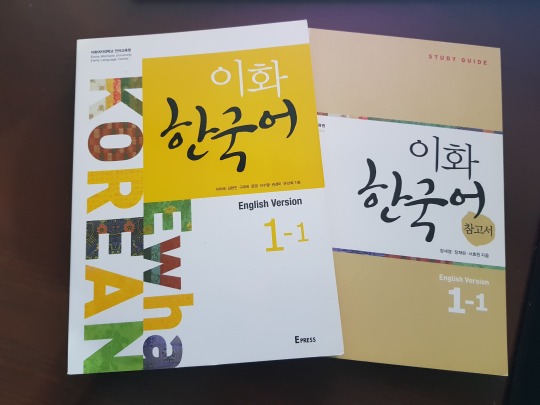
EWHA is best paired as a set with it’s companion study guide. As you will see, EWHA does not go as deeply into explanation about things as Integrated - and thus we have the study guide. Sometimes the study guide doesn’t offer a deeper explanation, either; often it’s unnecessary and as I’ve mentioned before, EWHA seems to want you to understand things through context and by gleaning things yourself. The study guide provides more examples, though, in case an explanation isn’t quite enough; you’re supposed to figure out usage and context with those examples. Sometimes it’s great! It depends on how you learn, to be honest. I find I need lots of examples AND lots of explanation, but I’m trying to learn to mine more from examples without being handheld and spoonfed, but like I said - we all learn in different ways.
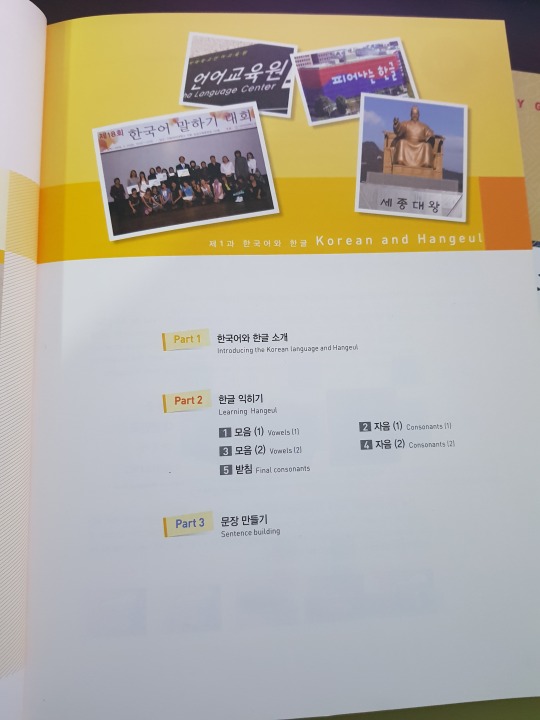
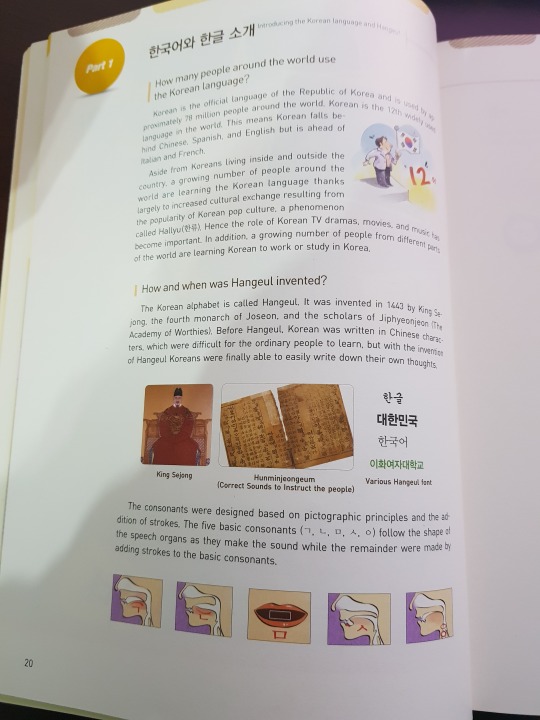
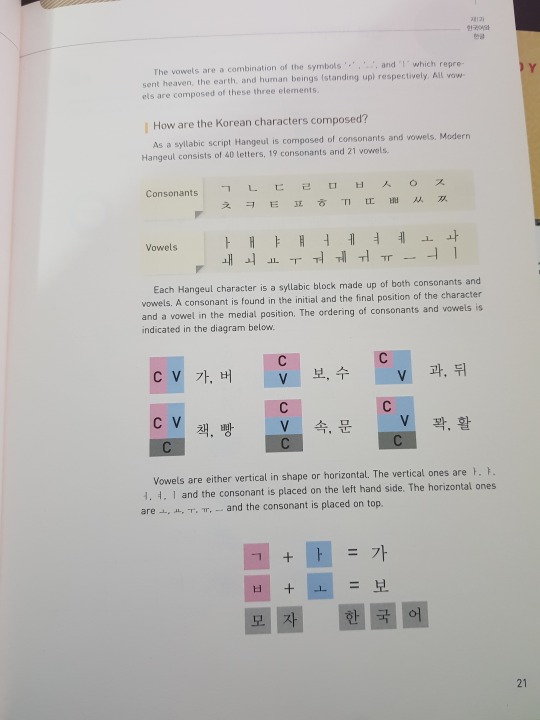
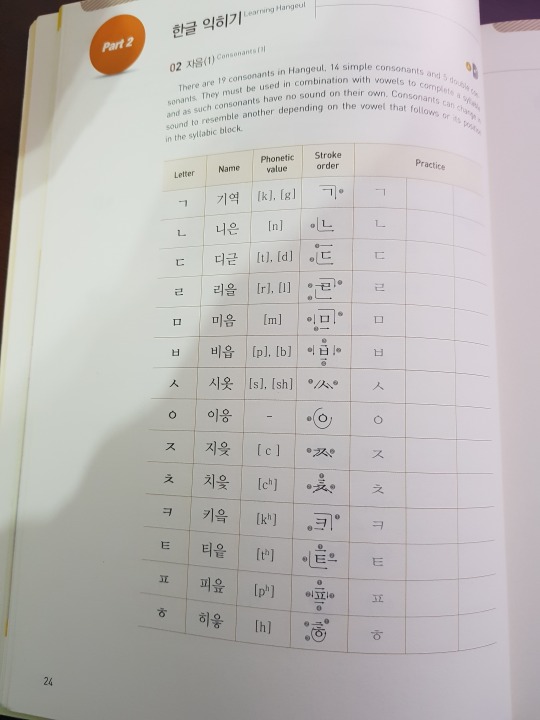
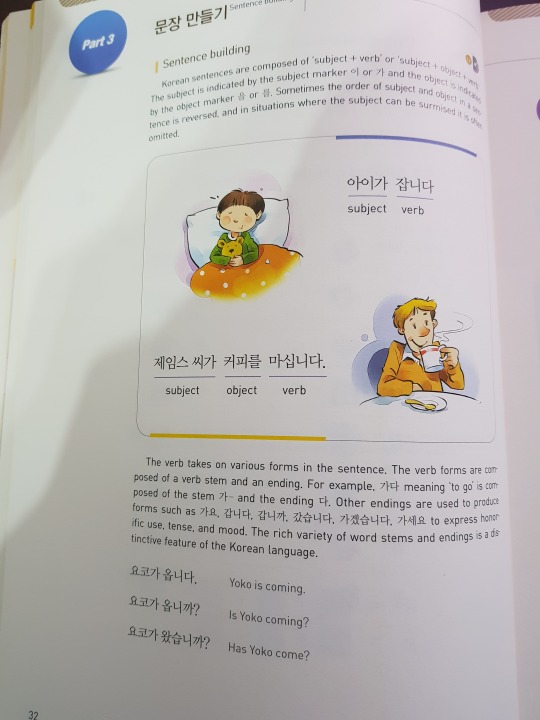
Much as Integrated does, EWHA has a good introduction to Hangeul in both pronunciation and construction. Though I don’t find it QUITE as indepth as Integrated is, EWHA tends to throw little tips at you as you work through the books that Integrated introduces in the beginning, and really you don’t miss much by getting them later.
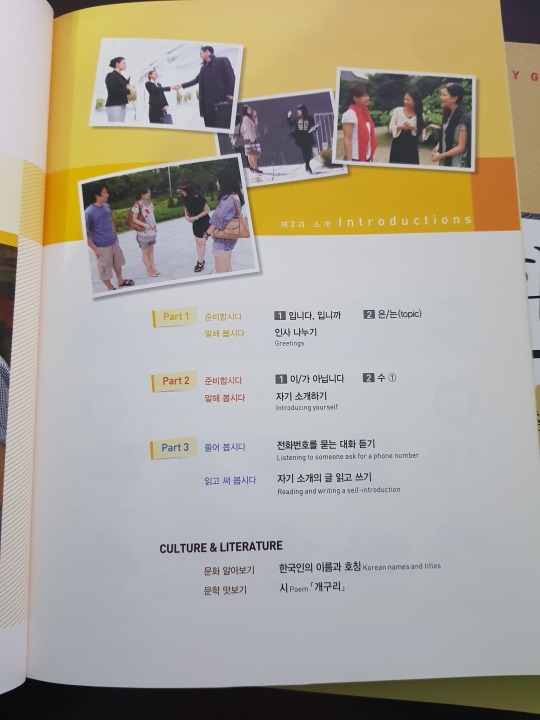
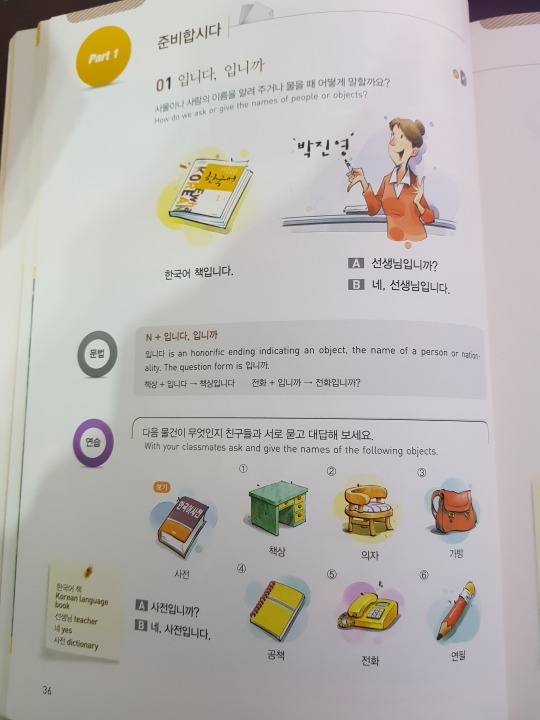
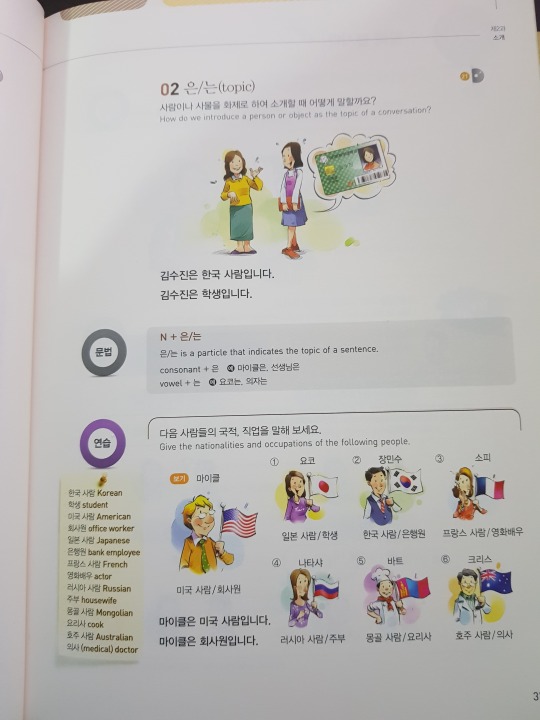
So Integrated is set up in lessons with conversations per lesson. EWHA instead gives you two prep lessons which will lead to a conversation practice. And where Integrated introduces one big word bank per conversation, Integrated just throws them all into your prep lesson. Sometimes it’s big, sometimes it’s small. Something useful that I didn’t do but probably should have was going through the entire lesson and write down the vocab or make flashcards if that’s your thing and review them before you get to them that way they have some familiarity to you. Or, on the other hand, you can go through at the end of the lesson and see which words you remember and then play with the ones you don’t. Your call!
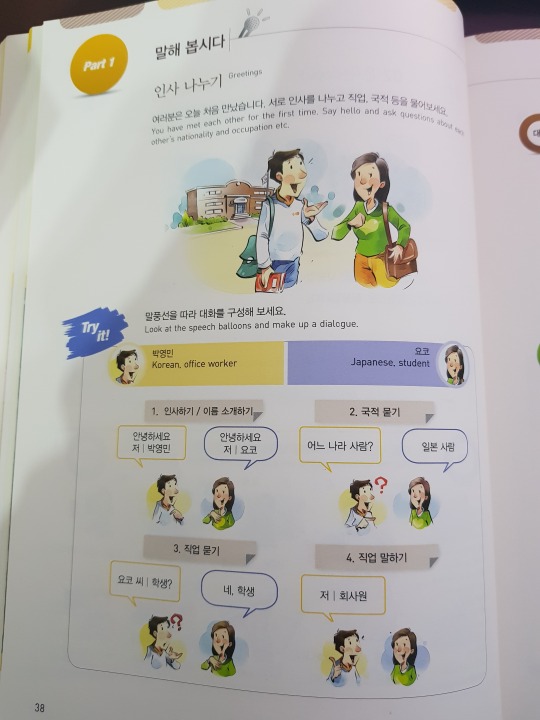
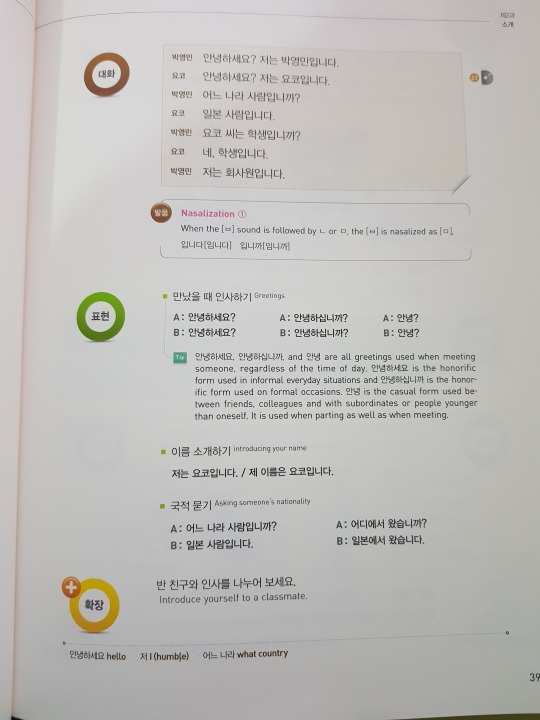
The prep lessons build up to a practice conversation! You get a little information about your roleplay characters and what you’re supposed to be talking about. Basically it’s guiding you and nudging you to use the grammar it’s just introduced to create a conversation. It tells you things like “make a greeting and introduce yourself” “ask their nationality” blah blah and you’re supposed to construct the conversation. On the next page they’ve written out the conversation how they want you to follow it, so don’t look! Cover it up as you try to do it so you don’t rely on just reading it. It’s a really beneficial way of learning to make sentences and especially to think outside of the box of what you’re used to!
As you can see on that page, sometimes they throw in pronunciation tips, which I definitely needed when I first started out! I was lucky I started with TTMIK who do a good job of explaining why ~습니다 is pronounced as ~슴니다 but other things I didn’t learn about until later.
They also give you conversational tips! Obviously you might not be able to figure out the conversation fully on your own, but the book has extras for you. It’s good to try your best and then to check the dialogue and see how or why they came up with what they did. I really like this part, because sometimes I get fixated on one way to say or express something, but as with all languages, there’s many ways to say things! I don’t know why I become so uncreative when I’m trying to construct things in Korean; I guess a sense of unfamiliarity where with English I know exactly how to throw things together. So these are parts are VERY IMPORTANT in really expanding your manner of speech and understanding!
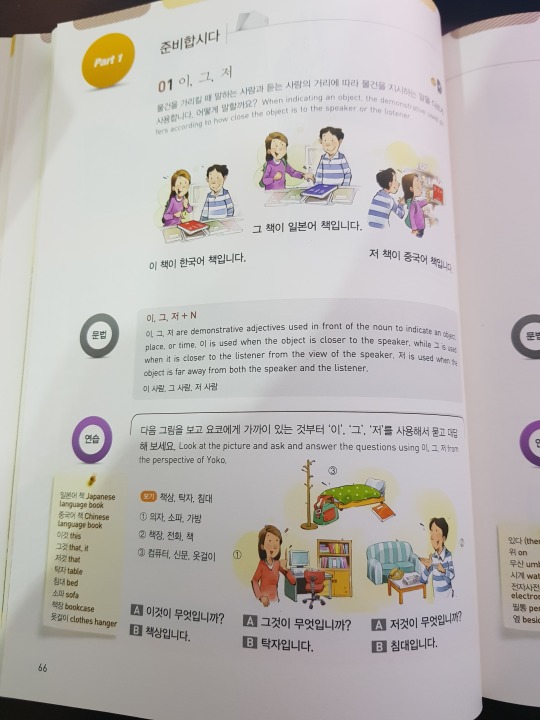
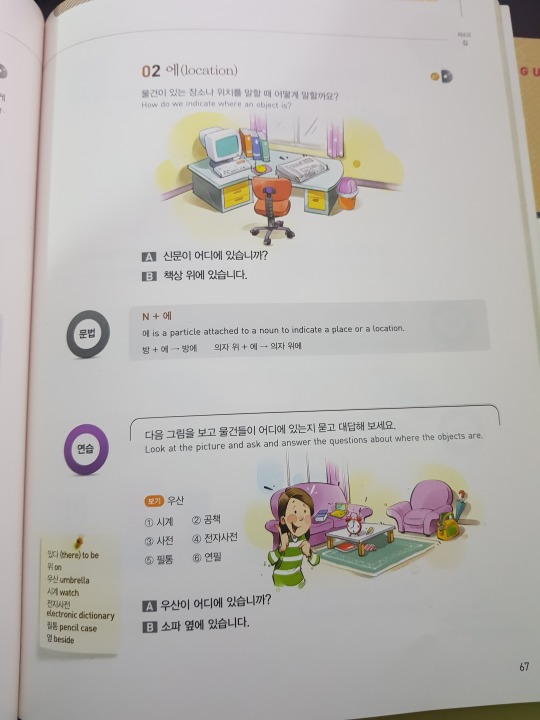
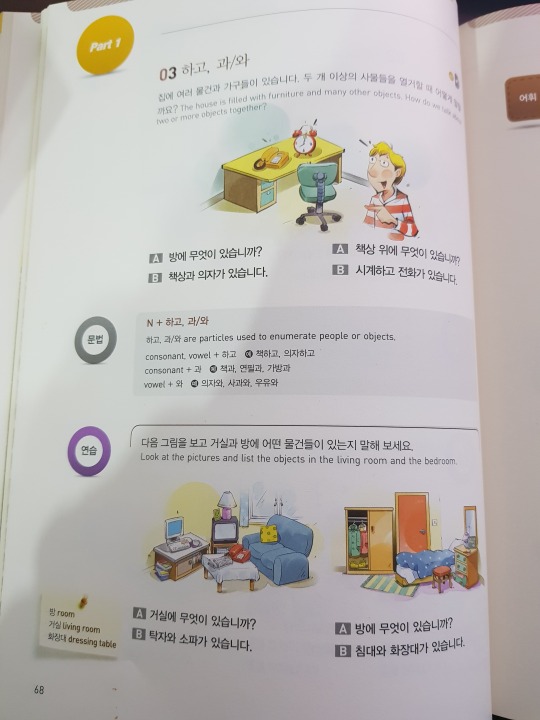
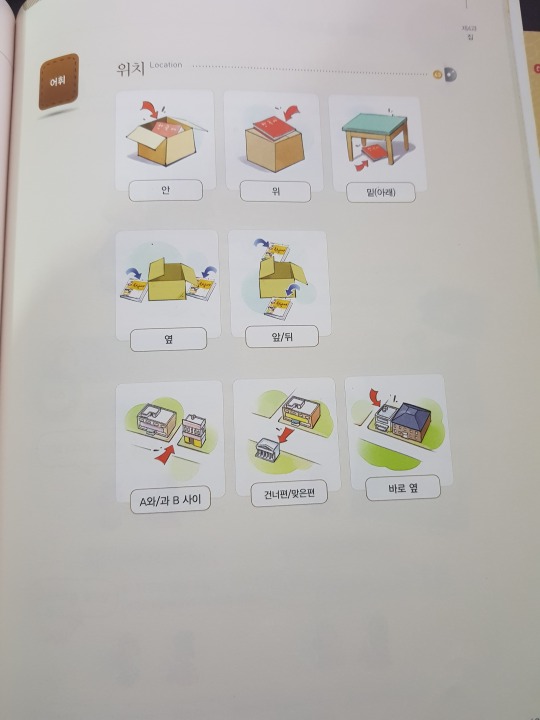
As you can see, it continues this way, following this sort of pattern of prep lessons leading up to a conversation practice. Occasionally, EWHA will throw in a page with images and what they are in Korean. Obviously, you’re supposed to figure out what they are visually but I’ll confess sometimes I’ve had issues with that, but don’t worry; the study guide has you covered! We’ll get to that soon, I promise.
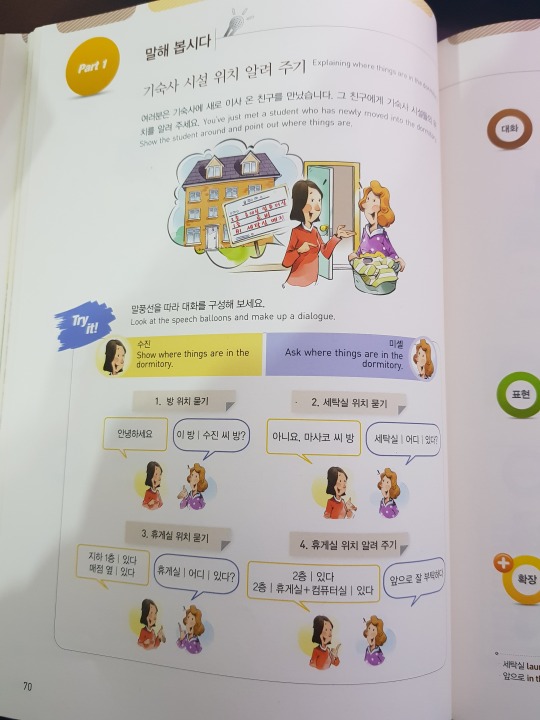
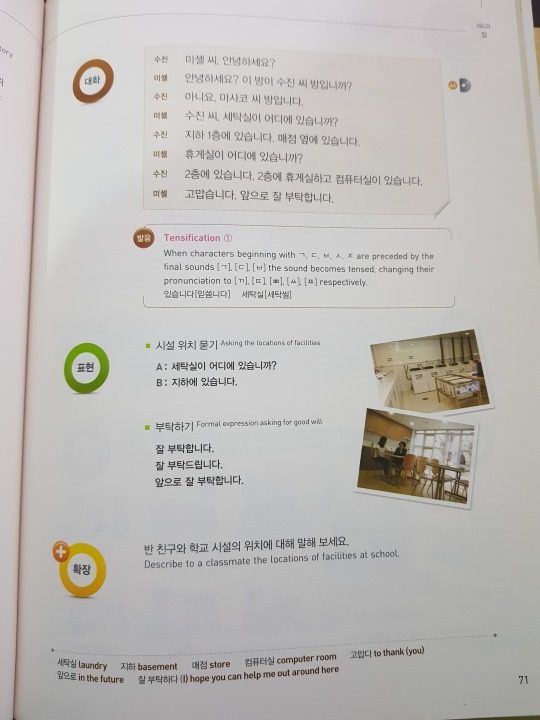
Another example of the conversation practice. Note there’s even MORE vocab at the bottom!
Towards the end of the lesson, there’s always an audio piece that you listen to and answer comprehension questions over and you get MORE fun little expressions like above, except these you’ll have to find in your study guide. It’s really important you get these as a set because if you don’t, you’re lacking an entire half of your EWHA experience - and the study guide just makes it better for self-learners.
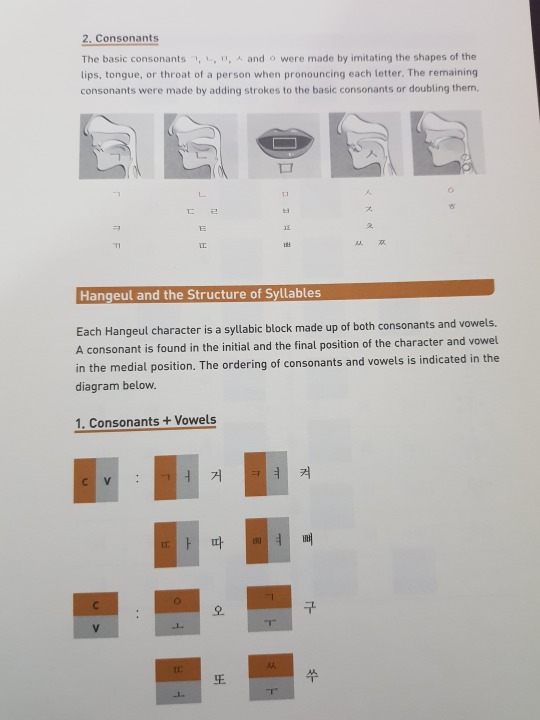
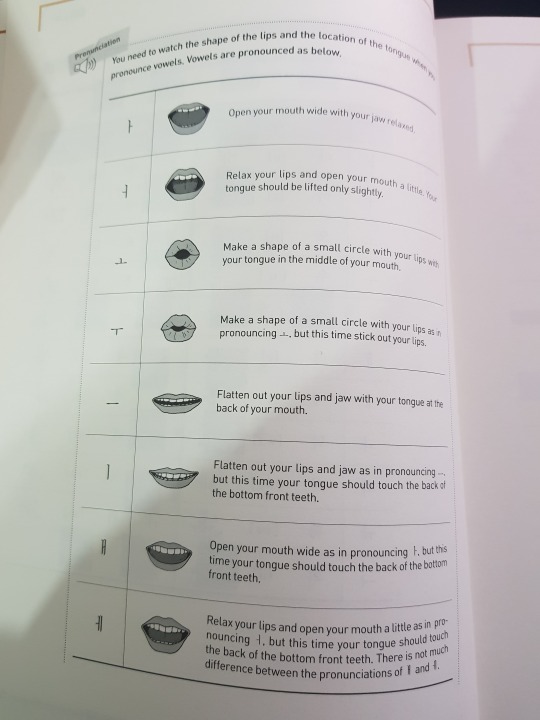
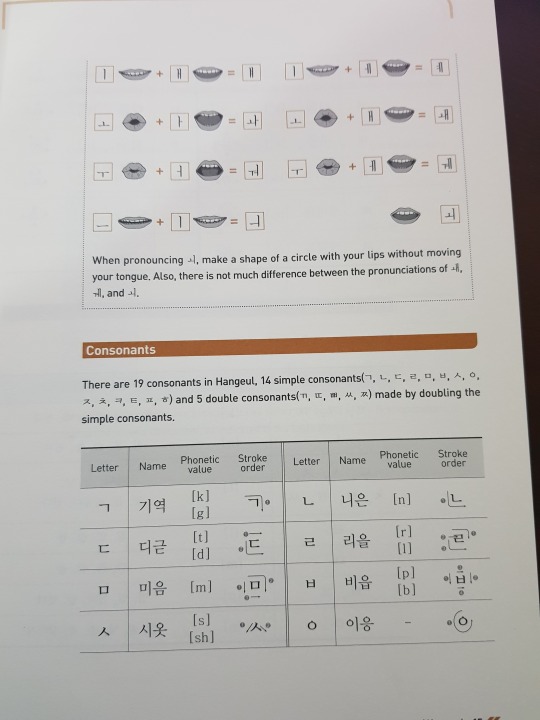
Like the textbook, it also opens with some pronunciation and intro to Hangeul type things. You really aren’t lacking for this kind of stuff, when it comes to these books! It’s also why I always recommend these to beginners! While I am fortunate to currently be in Korea where I can practice and have people help correct me, when I started out self-learning there was no one to do that and I was going off of (terrible) romantization to figure out how to say things. It was bad!
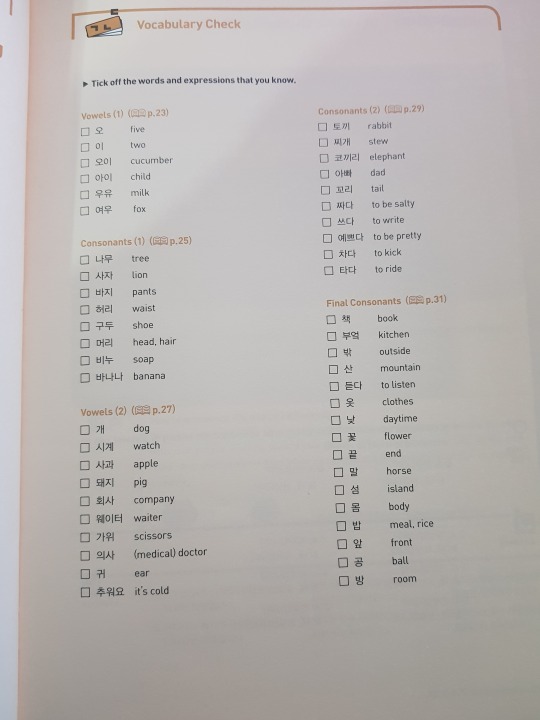
At the end of every lesson, the study guide has a vocabulary check and this! Is! One of my favorite! Things about the study guides!!!!! In the series 1 books it’s very often just words but as you get into series 2, you get phrases and the such which is useful because, again, sometimes I just forget how to construct things I know and it’s nice to see it used in ways that makes you go “ahhh” and helps you make better use.
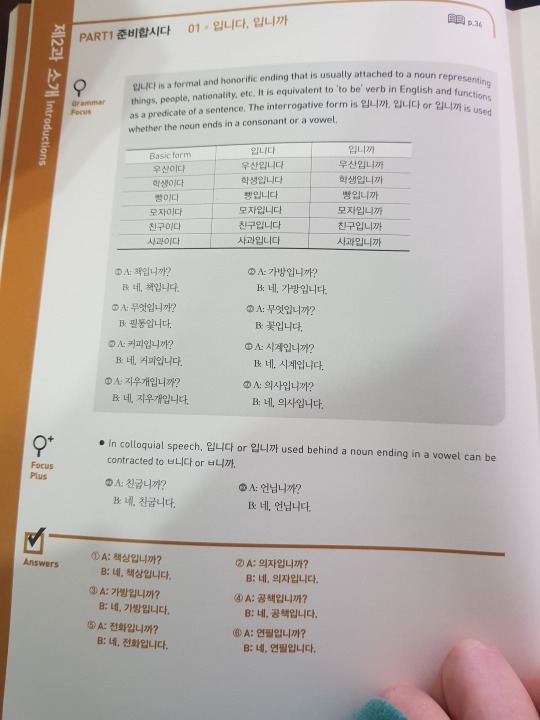
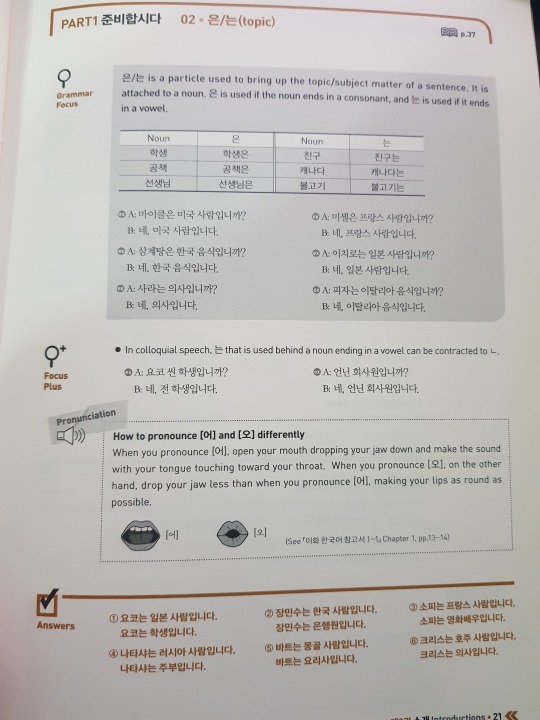
The study guide always shows which pages of the textbook it corresponds to. You can see how there’s a tiny bit of extra information in here; there’s not a lot at this point, because these things don’t necessarily need as much explanation - but there’s plenty of sample sentences! Read the sample sentences! If you’re having a hard time understanding something, reading the samples might be able to help you glean what you’re supposed to be understanding.
As you can see, there’s also an answer key to the activities in the book, which is really great if you don’t have anyone to check your work!
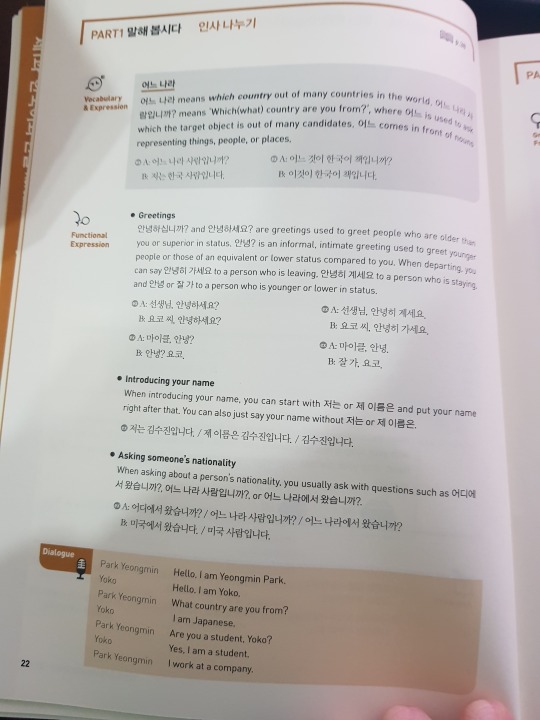
Remember those little expressions in the conversation practice pages? The study guide goes further into depth on them and helping you with your usage. This is the second best part of the study guide! It’s just really full of extras to help you out!
You can also find transcripts for the audio dialogues in here!
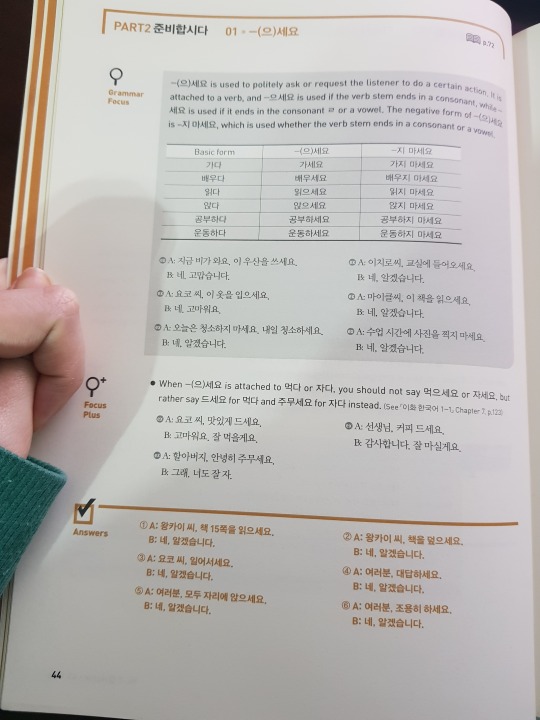
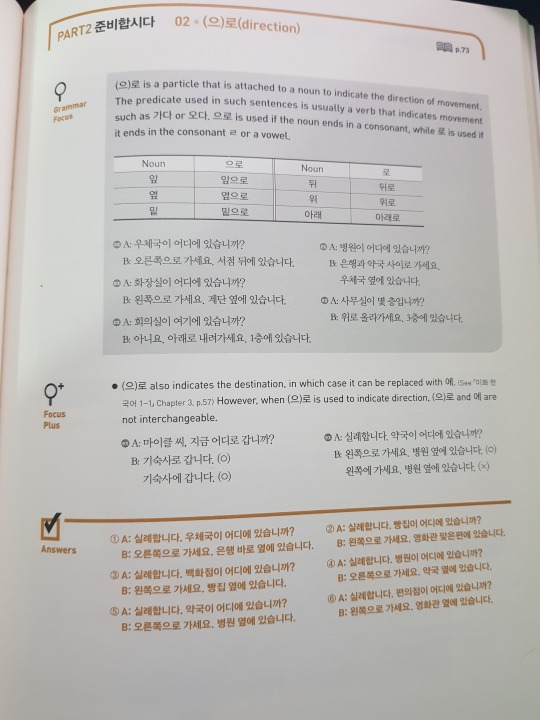
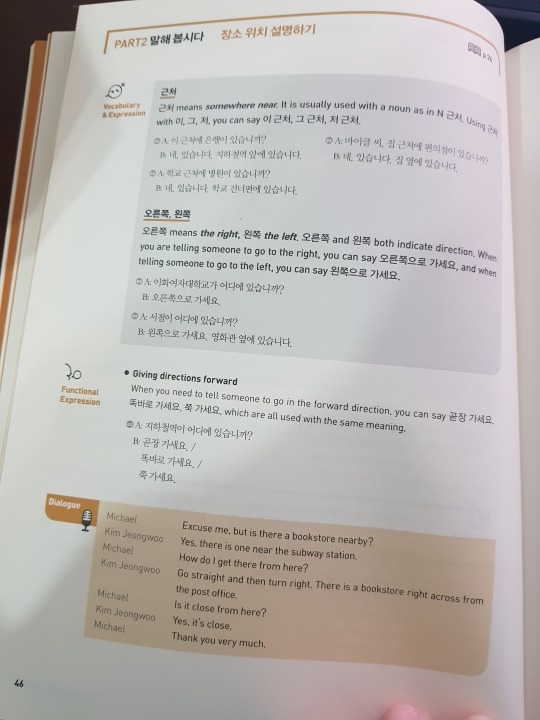
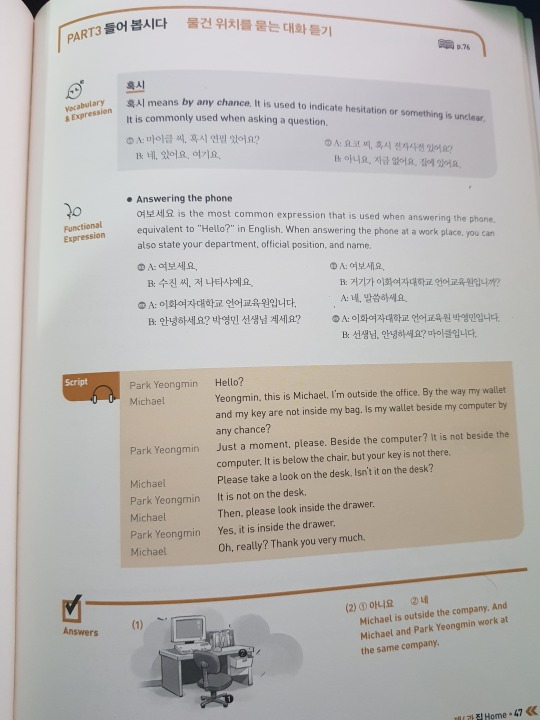
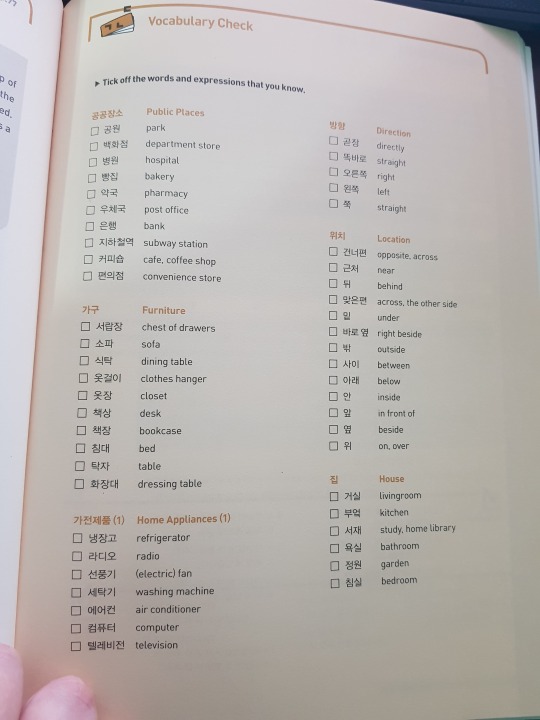
Just a few more samples!
Both sets are really wonderful for learning Korean. I maintain that the “best” one is whichever adheres best to your learning style. If you, like me, require lots of explanation, then Integrated might be best for you. It’s extra full of activities which really negates the need for a workbook. Unfortunately, you need someone to check your work, because while there’s translations for dialogue, there’s no answer key for your activities. EWHA is great for a self-studier in the manner that they DO provide not only transcripts/dialogue translations but also answer keys. Someone who doesn’t necessarily need things explicitly laid out can benefit from EWHA and to be honest, it could probably help people learn TO take meaning through context. Again, if you go with EWHA, you really need the Study Guides as well for the entire experience.
Some things: re EWHA. As you can see above, in books 1-1 and 1-2, your instructions and lesson introductions are written in both English and Korean. By series 2, the English there disappears. You still have English explanations and vocab translations, but your activity instructions and lesson intros are entirely Korean. By series 3, it’s FULL Korean. Your study guide still has English!!!! But your books? Korean! Even the vocab!!!!! I’ll try to remember to add pics of that later. But the idea is, of course, that you’ll learn as you go and eventually you won’t need it entirely written in English. I’m certainly not at that point yet, but I hope I’ll be able to get there soon!
Obviously, textbooks don’t come very cheap, so if you have to choose between the two sets, weigh your pros and cons. That said, the way I use them typically is that Integrated gets prioritized and then when I need a break or a review, I use EWHA. I used to review through Integrated but I find I’m not really taking in anything new when I’m just going over something I remember. By using both sets, I get different vocab sets, different situations, different kinds of usages of the grammar I’m learning. Both introduce things at different times. I’ve learned some things from EWHA that hadn’t been introduced to me at the time in Integrated where sometimes Integrated introduced to me things EWHA wouldn’t for a LONG time get to. But they both give me unique, fresh takes on things I’m learning. I’ve bought my books over a long period of time, so if you DO want to play with both, I’d say start with one set and later on down the line, add the other, so you can spread out the purchases.
Regardless, even if you can only choose one, I think they both have very strong merits as learning tools - and there’s always additional (free) options to help pad out your learning. I still make use of Talk to Me in Korean when I need to review something or I want another take on it or I need another explanation. When I REALLY want to get in-depth with things, I hit up How to Study Korean, where things are really broken down and in-detail explained. Don’t rely on just one study option. If you choose to use a textbook series, pad it out with the free online resources as well! The more ways you can see things used, the better it will stick with you!
I hope this is able to help a little! If you have questions, feel free to ask me! I can try to get some simple comparisons later of Integrated Intermediate level and EWHA series 3 books, and eventually I’ll do some write ups about the TTMIK books I own and the ways I find them useful!
11 notes
·
View notes
Text
This was such a big thing for me studying Spanish in high school vs studying Korean now. I have no idea at what level you start to learn other tense conjugation in Spanish, but in my two years, we never did. I spent two years learning in only present tense, only talking about hobbies and travel and food. I know there was some other useful stuff, but I guess it was never quite like when I got to Korean and I nearly instantly learned the verb conjugations for past, present, and future (the many, many, MANY ways you can use future tense lmao)
I’m not saying Korean is easier in this regard but I remember the STRUGGLE of conjugating in Spanish - without even ever touching past or present tenses! Verbs really DO open so many avenues! And learning new nouns alongside your verbs just makes it so much easier to build and learn to tell and talk and explain and afkljalfjafkljajf I love it!
Learning verbs makes me feel so powerful. It’s my favorite part of the first stages of learning a language. Now I can not only ask how you’re doing, I can ask where you’re going. I can say that I’m coming with you. I can say that I’m coming with you and we’re gonna buy some stuff and talk about what we study. I could go to your house and you can’t do jack about it. I can say all of these things now that I have the power of verbs. Like eight verbs. Fuck yeah.
2K notes
·
View notes
Text
Essay 2!
자기를 소개해 보십시오. ¹이름이 무엇입니까? ²어느 나라 사람입니까? ³무엇을 합니까? *무엇을 좋아합니까?
안녕하세요 여러분~ 나는 애슐리예요 그리고 28살이에요. Texas에서 사는 미국 사람이에요. 지금부터 두 달에 한국에서 이사하서 요즘 그 준비를 하고 있어요. 지금 직업이 없지만 나중에 일하고 싶어요. 생각하기에 서점에 일하면 좋아하겠어요. 요즘 한국어 공부해요. 한국어 잘 못하지만 매일 공부하서 실력 길러요. 많은 것을 좋아해요. 특히 책이랑 한국 드라마를 좋아해요! 책 쓰기랑 읽기를 좋아해요. 동물이랑 패션이랑 요리도 아주 좋아해요. 새로은 요리법을 찾는 재미있어요! 한국 음악도 좋아해요. 제일 좋아하는 그룹 2PM이랑 B1A4이에요. 그들을 너무 사랑해요! 두 번 B1A4 콘서트에 봤어요!
Kat sprung this question on me originally while I was asleep so we had to wait for me to wake up and coffee to get to this. Aaaaaaaaah. I feel better about this than I did the last essay question but also I think, as with the last essay question, you can see a lot of limitations with this? It’s okay though - like i said with the first essay question, I’d love to be able to revisit these once I improve and build up a better vocabulary and see how I can expand on them and improve them. For now I’m just happy to have been able to write as much for this as I did! There’s so much MORE I can write, obviously, but it’s just a struggle to figure out how to say the things I want to.
We talked a little about my last entry, too, and the v brief piece I wrote on the coffee and to my surprise she said I did well, which I really didn’t expect! I know when I try writing pieces, the more I struggle, the more clouded my judgment gets and I stop being able to tell how well I’m doing, if that makes any sense? We also talked about how you can sense the limitations in my writing but again, as I keep reiterating to myself (a necessity so I don’t start beating myself up, so I remember I am LEARNING and I have to learn through my struggles) the more I do it the more I’ll learn! I might have to do v baby language for a while but it’s better than no language at all! :3
Anyway there’s some things in the piece above that I’m not totally sure if I did right, but I definitely did try on this one lmao.
3 notes
·
View notes
Text
practice practice practice!
어제 저는 장을 봤어요. 저 보통 French vanilla 커피를 사지만 가게에 그 커피가 없었서 새로운 커피를 샀어요. 오늘 그 커피를 마셔 봤요. 그것을 좋아해요? 몰라요. 그 커피가 아주 달콤해요!
You know, I realize I don’t.... actually know how to talk about grocery shopping? I know it was shown in integrated 1 but I SWEAR I don’t remember it actually being used in a manner that I could learn from, so uh. An attempt was made. It’s probably wrong but the point is that I tried! Much like I tried this new coffee - I expected it would be sweet cos, okay, come on it’s Starbucks caramel lmao but holy crap by the last dregs of my second mug my tum was feeling some Things and not good things, either.
Anyway I haven’t studied as much as I meant to, partly cos I just didn’t have access to my workspace as long, partly cos I had a tummy ache from the coffee, but mostly cos I just need to be more diligent. I did, however, go over some stuff in how to study korean again and some book practices, so that’s good. The book is going over ~았/었을 때 now which is obviously an easy follow up to ~(으)ㄹ 때 but more importantly it’s talking about 그때는 기분이 어땠어요? which is REALLY exciting because tbh as far as feelings go, I don’t know a lot! I might even type those up later to try to further reiterate them in my mind, though I suppose obviously the better option will to be write about them specifically, but I may save that for tomorrow when my head feels more awake and alert than it does now.
I feel like this grammar piece is, for me, like so many others are. I understand it but I never think to use it and I definitely wanna drill more uses into my head, because I do in fact talk about “The times when” so! Get to it, Ashlie! (I miss skyping with Kristal and her forcing me to do things against my will :( )
For some reason I’ve been in a drama rewatching mood which is V RARE I almost never rewatch anything (cos there’s so many other things to watch and so many other ways to waste my time) but I decided to rewatch Oh My Ghost because I guess I like crying (and okay I’m pretty much in love with half the cast lmao) and try to use a lot of that time to work on my auditory Korean. Still TERRIBLE but you know. I’m trying, I try real hard not to be a brainless watcher lmao.
I’ll go finish up those lessons and see what follows and maybe see if I can’t put together some sentences (and let Kristal look over this and see how we can fix that above piece cos yoinks)practice
12 notes
·
View notes
Text
~(으)ㄹ 때
I’ve started to use How to Learn Korean a lot more lately when I’m studying from EWHA and need more detail. I appreciate what EWHA is trying to do - I really do, but I just don’t learn as efficiently that way yet. I hope eventually I’ll get to a point where minimal explanation serves me well, but I guess I really like detailed and lengthy explanations with lots of varied examples, and HTSK is good for that!
I remember when I first looked at it, I sort of was put off by HTSK, I guess because it feels like it teaches in a very different way and introduces things at a pace that I was not familiar with, either, but as a supplementary resource I’m really liking it. Especially because as I reiterate time and time again, my habits are really bad and thus so much of what I know is v patchy.
Fortunately, all my ????? when i reached ~(으)ㄹ 때 in EWHA got resolved by HTSK. Weirdly enough, while I’ve all along been understanding 때 I feel like it wasn’t fully setting in the way I needed it to? Or like. Hm, I’m not sure how to explain the exact problem, but the point is while I understood it, it didn’t sink in enough that when I tried to translate things I went AH right of course. So, tbh, this was a really necessary review. Thus, I really appreciate that they opened the lesson up with the simple uses of 때 because, again, I just needed that context again to be like duh ashlie duh.
And honestly, duh. Why was that not fully sinking in? \o/ Who even knows.
The funny thing about using HTSK is that often times, when I look up a specific grammar piece, they go even further in depth than EWHA does or seem to go beyond what EWHA at the moment might be doing, which you’d think is rather overwhelming considering who and what I am as a person, but to be honest, I don’t mind it terribly much. I can’t guarantee I’ll remember every use of something (which is a sad thing to admit, esp considering ~(으)ㄹ 때 doesn’t have many uses but you know how I am about usage blah blah ASHLIE WRITE MORE SENTENCES but I digress)
Basically this just further reinforces the importance of multiple resources. Also I feel less stupid when I go and look things up instead of having to ask Kat every time I have a question or don’t understand something. lmao. IT MAKES ME FEEL A LITTLE MORE INDEPENDENT so. ;A;
I guess I’ll finally go do this practice lesson LMAO and actually use it, tho. :3
2 notes
·
View notes
Text
Essay Question 1 Revision 1
Now that Kat’s looked over the essay question and made some suggestions/revisions, I’m going to go ahead and rewrite it here with said corrections. Certainly it’s by no means anywhere near complete but as I mentioned before, my current goal is to just keep revisiting this from time to time and attempt to pad it out and make it say more. It’s funny, cos it’s such a simple prompt, but it really leaves a lot of room to work with it, so!
Things bolded are changes that have been made at or by Kat’s prompting.
저는 여행을 아주 좋아하지만 보통 여행비가 아주 비싸서 여행을 많이 안 해요. 여행한 지 1년이 돼요. 뉴욕이랑 San Francisco는 정말 좋아해요. 뉴욕이 크고 많은 장소가 갈 수 있어요. 뉴욕의 명소들이 재미있고 그 장소들을 너무 보고 싶어요! San Francisco는 너무 아름다워요. 저는 이 도시를 정말 사랑해요. 친구랑 같이 San Francisco에 콘서트 보러 갔지만 콘서트가 츼소해서 그냥 도시를 돌아 다녔어요. 날씨랑 Pier 39이랑 건축 좋아해요. 뉴욕이랑 San Francisco가 너무 재미있고 두 도시를 사랑해서 그냥 진짜 좋아해요.
There’s so much more I want to say for this piece so I guess I’ll have to dedicate some time later to trying to find way to say them. :3 It’s a freaking strugglebus but! It’s also kind of thrilling, when I get passed all the icky fears of being wrong. AAAAHHHHHH. This feels so good lmao. Also I really, really gotta learn about using 진짜 cos apparently I just wanna stick it in allllllll the wrong places. Also, I am still soooooo wibbly wobbly at odds with 많이/많은.
Re: that, Kat notes that “I think it makes more sense to put 많은 after a noun rather than a verb”
And that’s that for now!!!! :3 I’ll probably go do some notes for a little bit and then maybe return to this and try to work on other sentences I can add to it or something, just. More details more details!
#studyblr#langblr#korean#writing practice#essay question#essay question 1#there's another essay question stashed away for later use but honestly i have no idea how to write it#not even as a grammar/vocab limitation manner but because it asks what's a present you want to receive and why#???????????????????????????????????????????#i mean i guess it's more of a matter of talking about how it doesn't matter what i receive so long as it comes from the heart and has though#t put into it but......... how the fuck do i convey that in Korean#haaaaaahahahahahahahahahahahahaha#later.#later i will LMAO
0 notes
Text
Essay Question~
여러분은 ¹여행을 좋아합니까? ²특별히 좋아하는 장소가 있습니까? ³왜 그 장소를 좋아합니까? 쓰십시오.
저는 여행을 진짜 좋아하지만 여행가 자주 비싸서 많은 여행하지 않아요. 여행에 간 지 1년이 돼요. 뉴욕이랑 San Francisco는 정말 좋아해요. 뉴욕이 커고 많은 장소가 갈 있어요. 뉴욕의 관광지가 재미있고 저 구 장소를 너무 보고 싶어요! San Francisco는 너무 아름더워요. 제가 진짜 이 도시를 사랑해요. 우리 친구랑 같이 San Francisco에 콘서트 보러 갔지만 콘서트가 츼소하서 도시 봤어요. 날씨랑 Pier 39이랑 건축 좋아해요. 뉴욕이랑 San Francisco가 너무 재미있고 저는 도시를 사랑해서 그냥 진짜 좋아해요.
Aaaahhhhhhh. ;A; Kat gave me the prompt and I strugglebussed my way through this. On the one hand, I know I can do better, in the sense that I know stored up in my brain is way more grammar and even vocab that I can use. But on the other, my Korean usage is just so...... bad that it’s really hard lmao to do right now? Which is obviously the whole point of this - I clearly need a lot of practice. She’ll eventually read it and probably tell me what I can do better lmao but I’m going to leave this original one here, if only so one day I can look back on this and go WOW YOU’VE REALLY IMPROVED. I def want to be able to answer this better one day - to be able to explain even more (because believe you me there are so many reasons I love both New York and San Francisco that I definitely didn’t touch in there because it was hurting my head to try to think of how to express it) and I guess an eventual goal will be to better write that above. To talk a lot more about the sights and crowded streets of New York and the atmosphere of San Francisco and being able to drive to the ocean and the vineyards and the trees and the aquarium and driving across the bridges and more detail about the house styles and the architecture and how downtown San Fran is like the lovechild of New York and California. I wanted to talk about the variety of food in New York, too, and I KNOW I can do that - I even have a vocab bank somewhere with the words kind(s) and diverse so!!!! I should be able to do that but guh I drew such a blank lmao.
So that’s definitely something I want to work on and if nothing else it shows me where I feel my shortcomings are (LMAO EVERYWHERE) and once Kat looks over it I’ll have even more detail and maybe better ways to phrase and lajfakfj the point is.
While part of me is still really, REALLY scared of messing up and making lots of mistakes, it’s necessary for me to improve and I don’t feel QUITE like throwing up - not nearly as intensely as I usually feel it at least! I’m such a low low level and honestly I’m still very BAD at Korean and I know it. I want to be better - esp for how long I’ve studied - but I’m not there yet and it’s because I haven’t done enough of THIS: using it and messing up and learning how to do it better. So. :3 Here’s to THIS and the improvement that comes from it.
I meant to go back to bed for a few hours before I did this and so I haven’t even had coffee yet but whatever gentle ache was cropping up with my brain seems to be going away! But I do feel tired so I still need to get a lil more sleep cos god knows there’s no way I can be up all day considering I woke at 2:30, 3 a.m. (I woke yesterday at 6 and still crashed by 8 p.m. LMAO)
#langblr#studyblr#Korean#writing practice#essay question#gotta have some tags so that i can keep doing more of these and actually be able to find them in my own blog hahahaha#essay question 1
0 notes
Text
Uuuuuuuuuuuuugh take two. I started this post, saved as a draft and then POOF. it gone.
Anyway first off wow this is post 100 and i’m like CAN U BELIEVE but also woooow that’s sad cos for as long as I’ve had this blog I.... should have posted way more, but whatever can’t change the past!
Obligatory spiel about my absence: January was a really shit month, as January tends to be for me, and so it’s taken me an unnecessarily long time to get back here and to my studying, but now that I’ve got my books out again, everything feels SO GOOD. I can’t describe how good it feels to be somewhere in my book and able to figure out what I’m reading and understand things with certain clarity. I find often I spend a lot of time struggling to really understand what I’m taking in and thus not really taking it in at all and it basically makes me feel very muddled and confused and not like I’m learning anything. So to reach a point - ESPECIALLY after a really bad phase of fogginess and incomprehension - where things just CLICK and I can actually not only understand but EXPLAIN them? Guh, it’s an indescribable feeling. I can’t compare it to anything else.
But like I said, January was just terrible. I was reading back on old entries in here and there was a post or two that were just difficult to read for that reason. It was a long period of doing nothing but sleeping or wanting to sleep and an awful, impenetrable foggy haze and nothing was retained. I started back where I left off, under my recent plans that I’ll just spend less time doing excessive reviews and hoping it’ll come back to me or I can figure it out by context but it was so obvious I retained nothing that I HAD to do a review. Fortunately, I’d only just started EWHA 2-1 so it wasn’t like I had a LOT to review but it was definitely necessary! I struggled so much with it back then that by the time I reviewed it now, it was practically new.
On the bright side, the review made me REALLY understand things! That’s not to say it was totally easy. I definitely struggled this time around and had to look up some things or else ask Kat for help (she insists she did nothing but she was literally the key to me understanding -에 비해서 because the book didn’t explain it well at all and even the study guide didn’t help me enough because I just was in that weird plastic-wrapped brain feeling where nothing actually sinks in!)
The point I’m getting at is: it was one of those times where a review was highly necessary and I’m really happy with this feeling of understanding. At night I’ve been trying to review grammar points in my head before I sleep, which is something I should become more diligent with.
Now that I’m caught up to where I was before, I think I’m going to take a break from plunging on and just work with the grammar and vocabulary I’ve learned, so that I can try to make them REALLY stick. I was talking on twitter about this, but twitter is twitter so it’s really hard to express myself sometimes but. I want to get to a point where these grammar points are a little more inherent. To this day, the only grammar point that I consider to be TRULY inherent to me is -고 싶다 lmao but a lot of them I can typically recall or understand when I read, but I need to reach the point where if i want to speak or write something, I don’t have to spend 800 years thinking of it - and that’s where I am right now. Obviously this means I have to give myself a lot of writing exercises, so that’s what I’m going to do! As well as that, I know flashcards aren’t the most useful things, but I think as a supplement, they work well for me. In the end, the best way to learn vocabulary is by USING it and coming up with sentences that you can recall, and reading things and just immersing yourself with it, but in that sense, flashcards can help if only to drill a sense of familiarity. (But never rely on flashcards alone!)
I guess this post doesn’t say very much at all but mostly it’s just serving as my own update. I have a lot of notes but I’m not sure how I wanna blog them, so I guess instead I wanna work on writing things first. Another thing I mentioned on twitter re: retaining grammar points is that for a lot of these, I don’t speak the way they do. My voice is very strong, I know, and I have a very certain manner of speaking, and that’s a big thing about learning another language is learning to think in the way of that new language. How I speak in English may not translate well to Korean. I certainly don’t have enough grammar knowledge, I don’t think, to do so yet, and maybe I never will - and that’s okay. English =/= Korean. So a big part of this practice of writing with grammar points is learning to think in that manner. I think this is maybe whey it’s so hard for me to sometimes write sentences? (That and my belief that my vocabulary is far more limited than it really is.) Learning to think in new ways is difficult, especially when you’re so very set in your own ways! But it’s such a necessity. Therefore, I plan to start small by doing things like writing 10 sentences and then maybe I’ll do 10 more, but incorporating more grammar points. (For example, the aforementioned -에 비해서 made use of this with some of their sample and practice sentences, where they’d throw in things like 어제 본 영화는 재미있어요? And you’d be surprised at how often that sometimes throws me for a loop. I really do forget so much that I can say things like “Was the movie you saw yesterday fun?” like. It’s just PROOF that I need to do so much work! Note taking and studying only does so much, duh! Stop being lazy self!)
Mostly I’m just in this really great position of understanding things and being able to use them and I know once I forage ahead it’ll be all new stuff, and that’s okay. As long as I get myself feeling even better about using these pieces, I’ll be good! Like I said before, I really, really love how it feels to be at this place - esp when I’ve had so many bouts of feeling worthless and stupid and just incapable of a lot of things. It feels good to feel like I’m LEARNING and going somewhere, instead of reading, comprehending and then struggling. Aaaaaaaah!
7 notes
·
View notes
Photo

새해 복 많이 받으세요!~
Happy Lunar New Year Everyone!~
Today, let’s take the time to learn about Korean culture on this widely celebrated holiday!~
Here are 6 things you should know about 설날 (Lunar New Year’s Day in Korea):
1. 설날 (seol-lal):
설날 is one of the biggest holidays for Koreans! Just like the New Years for us ‘Muricans, 설날 is a momentous time of the year for families to come together and celebrate with lots of love, laughs, warmth, and of course, wonderful food!
2. 차례 (cha rye)
차례 is an ancestral rite performed on 설날. Traditional foods are specifically arranged and set on a ritual table where families bow to ‘greet’ ancestral spirits to express gratitude and pray for the family’s wellbeing throughout the upcoming year.
3. 세배 (sae bae)
세배 is a deep traditional bow often performed in respect to one’s seniors. In my family, we all gather and bow to our eldest grandparents and receive their wisdom and wishes for us!
4. 새해 복 많이 받으세요!~
This phrase is used especially when bowing to an elder. It means: “I wish you many blessings (much luck) this year!”
5. 세뱃돈 (sae baet don)
세뱃돈 is the New Year’s “gift of money”. After children perform the 세배 to family elders, they often receive some money (세뱃돈) as well as the wishes and wisdom that the elders impart on them. Korean 세뱃돈 can be likened to the money given in Chinese custom, 红包. (恭喜发财、红包拿来 hahaha)
6. 떡국 (tteok guk)
떡국 is a Korean traditional soup that is made and eaten with the family.
Interesting facts~
구정 and 신정: Korea has two New Year’s celebrations! On January 1st, the celebration of the solar new year is called 신정 (shin jeong), and the lunar new year celebrated in late January / early February is called 구정 (gu jeong)!
Hope this helps and happy studying!~
2K notes
·
View notes
Text
Sarcasm in Korean
HEY COOL CATS it is summer and i am back to post so imma give you a couple of my fave sarcastic expressions
as a general rule for being sarcastic in korean, the -네 ending is used often and it’s important to place emphasis on words like “잘~” “참~”
빵 터지네 that’s funny
딱이네 awesome
여기 오길 참 잘했네 I’m so glad I came here
돌겠네 perfect
기똥찬 생각이네 great idea
무진장 고맙다 thanks
거참 재미있겠네 that sounds great
퍽이나 yeah right
참 잘 됐다 good job
4K notes
·
View notes
Text
Rising From the Dead... Kinda
My inevitable hiatus went on much longer than I’d intended but no one’s really surprised by that. What was SUPPOSED to be a summer full of study... was.... not. Oops. Actually I’m more bummed about it than I seem, but we can’t change what’s already done, yeah? It just sucks cos we know lapses in my studying really fucks me up. Even once I was staying with Brittany, I was really hoping I’d be able to make studying work, but it was SO HARD. I guess if I’d taken the option to have my own room it’d have been fine but I was worried about the scorpions okay???
I digress.
The smart thing to do would be dive back into Integrated Beginner 2 and review all those things I’m so rocky on and maybe do a coarse review of EWHA 1 2 but that sounds like.... a Lot of Review and frankly I wasn’t feeling up to it. (If we’re being frank, tho, I’m not feeling up to much of anything, like crawling out of bed and existing, but hey, we do what we gotta.) Anyway I figured might as well just carry on with the ending of Integrated Beginner 2 - I’m really close to the end - and just go back and review things as they crop up if necessary. But then, because I am me and I am a brat, I really, really, REALLY wanted to start the EWHA 2 series. So, you know. I did. And really, again, who is even surprised?
Fortunately the good thing about this decision is that the EWHA 2 series will help cover a lot of what is in Integrated B2 anyway! So that way I don’t need to worry about the review AND when I get it, it’ll be fresh and different, which really helps. And as usual, it has a whole lot of OTHER stuff I’ve never touched on before, both in grammar and vocabulary. My poor baby levels - I’m getting there, though. Slowly, but I’m making progress. Last night, Brittany asked me to try to translate a tweet about this season’s greetings she’d ordered - it’s getting a delay. The funny part was that it was based around a grammar point I had JUST studied (-(으)ㄴ 지) lmao, like it was some kind of Sign about finding it in use. It was a struggle to understand, not gonna lie, but I got there for the most part!
Actually, to be honest, Korean in general lately has been a struggle. Everything has been a struggle. My sleeping is really messed up, my general existence is messed up. It must be that time of year and it’s making it SO HARD to deal with. If I’m not sleeping for 12 hours at a time, I’m awake wishing I was sleeping. There’s a near constant haze of fogginess that sometimes lifts around, idk, midnight-2 a.m.-ish, around there, for a few hours, and sometimes things get clarity then, other times, it just never lifts. I’ve been watching a lot of dramas lately (well, a lot for ME) because haaaah basically nothing else interests me terrible much, which is, haaah you know, what’s new, and I feel like I’m literally forcing myself to study. And there are some nights that studying is fine and good and I do it well and there’s other nights I feel like there’s plastic wrap around my brain and while i GET things, it makes it hard for it to sink in, or else makes it harder to understand and takes so much more effort. It’s such a struggle, everything feels like a chore, but after it’s been so long since I had a consistent study schedule, I’m trying really hard to get through it and get better. It’s just. Hard.
Like, for instance, that aforementioned grammar point gave me a lot of hell, because somehow getting from one point to another was SO DIFFICULT. So sluggish and... idk I guess it felt vague. It’s a case of NOW I understand, but at the time I guess I just somehow wasn’t quite understanding how things translated? On the one hand, I almost feel like things aren’t being explained as well as I’d prefer in EWHA 2 but I realize this is probably just the state of my funk and how difficult it is to do ANYTHING, much less new things. In fact, I probably should go ahead and review this point later tonight, just to make sure it’s still actually there and that I can actually USE it rather than just understand it. (한국에 온 지 1년이 됐어요. It’s been a year since I came to Korea.) Idk I’ll... touch it again and see if it still feels like it’s fucking me up or not, cos I can’t otherwise explain WHAT was tripping me up except, I guess. Myself.
lmao god looking over it this post sounds so... not self-pitying I guess just sad lmao as a fact. ah well.
The other point that was fucking me up recently was ~(으)ㄴ/는/(으)ㄹ 게 아니라. Honestly, from the get go it was vaguely overwhelming, I guess just cos it applied in different ways? \o/ Like I’d just covered (이)라고 하다 so at some level it already made sense. And in fact, the grammar itself made a lot of sense! “No, not this but actually ____________” But here’s what actually fucked me up.
A: 그 잡지를 샀어요?
B: 아니요. 산 게 아니라 친구한테서 빌린 거예요.
Like in retrospect, I’m pretty sure I was confusing it for -ㄹ 거예요, and you can imagine what kind of frustrations and confusion this was making. Have I learned -ㄴ 거예요 and just don’t recall it at all? Sounds really possible. Is it just a part of the grammar point? I was so confused as to why it wasn’t answered 산 게 아니라 친구하테서 빌렸어요. Like, I MUST be missing something!
And see, here I thought oh maybe it’s just part of the grammar point this is how you respond, except then there was THIS:
A: 장소이 씨, 요즘 컴퓨터를 배우러 다녀요?
B: 배우러 다니는 게 아니라 학원에서 아이들에게 켐튜터를 기르치고 있어요.
But a lot of other sentences use the -(으)ㄴ 거예요 so I guess the whole of typing this up has just... lead me to this? but. lmao idk man.
SO THE REAL QUESTION IS: HAVE I ACTUALLY LEARNED -(으)ㄴ 거예요? AND IF SO, WHAT THE HECK DID IT MEAN COS I SURE DON’T THINK I REMEMBER THIS. AND ALSO. ugh.
2 notes
·
View notes
Text
날씨는 어때요?
This newest lesson/chapter I’ve reached is dedicated to weather (and, presumably, weather related activities). It’s really funny how, when younger, weather was deemed such a BORING and ADULT kind of conversation, some kind of small speak that grown ups did to pass pleasantries with each other, but as I’ve gotten older, so much of my conversation is unabashedly weather. Every day I’m bemoaning my loathing of summer, complaining about the hot temperatures and the gross, muggy humidity, so what a perfect lesson, right? Hahaha. I won’t lie - I’m ridiculously delighted to be able to start talking about weather, tho I know i’ll have to take to naver and figure out other terms for things, I’m sure. But fortunately, ewha does usually introduce a nice variety of terminology, so hopefully I won’t be let down. I haven’t looked at the vocab at the end of the chapter in the study guide but now that I’m bringing it up I’m thinking maybe I should preview it at the beginning of each lesson/chapter and then again at the end.
Following the introduction (review) of ~고 was (이)나 and I figured since I’d just learned to talk about weather in a number of ways (I’d forgotten about 바람이 불다 for instance, and had learned the whole 기온이 (영하) ##도 and gotten familiar with that) I thought another light review would be nice. I even thought to myself ‘Oh, interesting that they’re introducing it separately of 밖에 that’s probably useful so it doesn’t come off too confusing’ except... ㅋㅋㅋ as it turned out, this (이)나 was not the one I was thinking of, but something entirely new to me!
I’d been wondering for a long time how to say or if making a list. I mean, that seems to be the case for this use of (이)나? The study guide notes it as having the meaning of ‘or’ and some of the examples have been the matters of what do you USUALLY eat, and the answer as this or that in the sense of sometimes this, but sometimes that rather than like... singling one thing out, so hopefully I’m understanding that well, haha. They didn’t provide a sample that uses a third item, so I’m going to assume that you just go ahead and list it after the second and nothing requires 하고 since (이)나 is already there?
I haven’t really done anything else, though. Well, I think I have but nothing worthy of really writing about tbh. Yesterday I didn’t wind up doing anything* and today has been a mess of ‘want to study but can’t find the focus’ which is such a terrible mood - when your desire is blocked by lack of motivational will power, but I got through some of it! Hopefully before I make it back to sleep I’ll get some more studying squeezed in.
I say it all the time but man. I’m SO HAPPY I bought these ewha books. These have been SO, SO good to me. *~*
* to be fair, I DID start making a bunch of new flashcards on anki yesterday but god I was just so miserable and foggy headed. I slept badly and I think the day before I’d gone without caffeine so my whole system was wonky and whacked and generally miserable and unable to accomplish ANYTHING. Even finishing the flashcards was a struggle! But I reviewed them so that counts for something!
3 notes
·
View notes
Text
New Stuff!
I feel like so much of EWHA has mostly been review - at least grammatically, because god knows this has been an entirely different game of vocabulary for me - but I’ve recently started to hit some new grammar that I’ve not yet come across in integrated. In fact, I’m not sure if they just haven’t been introduced yet in Integrated or not, because I’ve yet to finish beginner 1-2 HAH but also because when I mentioned it to Kristal, she had no idea what it was. So unless she learned it and forgot (which is entirely possible, at least with myself haha) it’s really new stuff heu! (Maybe this will light a fire under her bum to using ewha as well hahaha)
Anyway, the first new thing was ~(으)려고 하다, which I’d mentioned to Kat before getting to and she noted was v useful as she uses it a lot. But tbh, I feel like the book didn’t really tell me a lot about it outside of what was obvious - that you’re talking about doing something (or something) occurring, that is yet to happen. But ~(으)려고 하다 isn’t exactly the first future tense type point I’ve met before, considering ~(으)ㄹ 거예요 and ~(으)래요 (tho notably the latter was introduced in integrated so there’s no reason for ewha to touch upon it but i digress)
I wound up searching up on TTMIK to see if they had more insight on using it vs. ~(으)ㄹ 거예요 and ~(으)래요 and to be honest I still feel a little bit underwhelmed? My understanding is that ~(으)ㄹ 거예요 states something with conviction (?), set in stone, known for a fact (비가 올 거예요 as the example to say that you know, for certain, it will rain, whereas 비가 오려고 해요 being more like, from what i can tell/how it looks/etc it looks like it’s going to rain - situational guessing. Also notably this was “talking about a state of the near future” but I digress)
Also TTMIK mentions that for showing intention, ~(으)려고 하다 in its plain present tense isn’t used as much because it sounds v formal and textbook - but is good for formal situations. So I guess it’s probably seen more in the past tense, for the matters of I WAS going to do such and such (but it didn’t happen). (TTMIK took it a step further, showing it in the form of ~(으)려고 하는데 - so I guess when using it in present tense, maybe it’s seen much more like this, rather than its plain form? Less stilted? \o/)
There’s also a conjugated form for it for conversational purposes, being ~(으)료고요. Does that... make it less stiff sounding?
There was also ~(으)십시오/~지 십시오, which I understand is a higher formality/politeness to (으)세요? Like, I understand it to be PRETTY FORMAL right? (Am I wrong in thinking I’ve heard it used in sageuks?) Mostly it was used with directions, which was a necessary review for me, cos god knows I still struggle a bit with that. I feel like I’m finally getting better at that, maybe because I feel like ewha has introduced new and other ways to do directions? Or rather, because it’s broadened the usages and given me more words to use with it? \o/ I might just be unfairly harsh on integrated in this manner, but I think ewha has been handling directions a little better.
Actually I was thinking last night about what I think ewha does differently with its grammar points to get things over a little easier is that rather than just introducing points, as integrated does, it cleverly introduces them over the guise of a topic? So you think of it less as a grammatical part and more as its role in this current topic - such as talking about what you want to do after class - so you focus more on what it does? And thus you’re applying usage in an easier manner? I don’t know if that actually makes any sense, but!!!!
Anyway I’ve decided that this week I’m going to work on my anki vocab sets because I just gotta do the drilling and at least anki helps focus on my weakest areas. Kristal and I were talking about how we’re both just so WEAK in vocab and I do know I retain certain things through exposure and excessive usage, but it takes a lot of usage, and I have a lot of words to be trying to get up in my head!
#ewha 1 2#Korean#langblr#studyblr#grammar#i'm just so lazy about setting up my vocab sets on anki right now ngl#and i don't know why lmao#rolls around#all i gotta do is use it when i'm on tumblr or kakao like?!
2 notes
·
View notes
Photo


Most days THIS is what my study area actually ends up looking like. Pls note the notes scattered by her lounging. This pic was taken WHEN I WAS ACTUALLY TAKING NOTES AND READING FROM THE BOOK and she invited herself over - plop. :/ Okay Moo, i see. ;A;
3 notes
·
View notes
Photo



On a good day, this is what my “desk” looks like when I’m studying. Pls note the cat on the laptop - the laptop isn’t usually there, but if it is, Moo finds it quite cosy. Better Zeus than my textbooks, I suppose. LOOK AT THAT FACE THO how can I say no to that face ;A;
#MoxieMoo#the entire purpose of this post is to just show off my cat ngl#also the upcoming post#cos i'm obsessed with her
0 notes
Photo
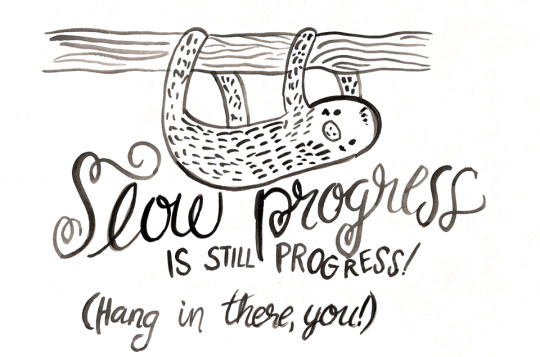
#reblog#leaves this here because this is the kind of thing i need to keep reminding myself#i've had this blog for 3+ years man#i've 'technically' been learning for 3+ years but only recently REALLY applied myself#only recently have i REALLY begun getting anywhere#and that's okay!!!!!!!!#self learning is a disciplined practice and that's hard okay#getting as far as i have at all is a wonder! progress is progress and i got this!!!!!!
27K notes
·
View notes
